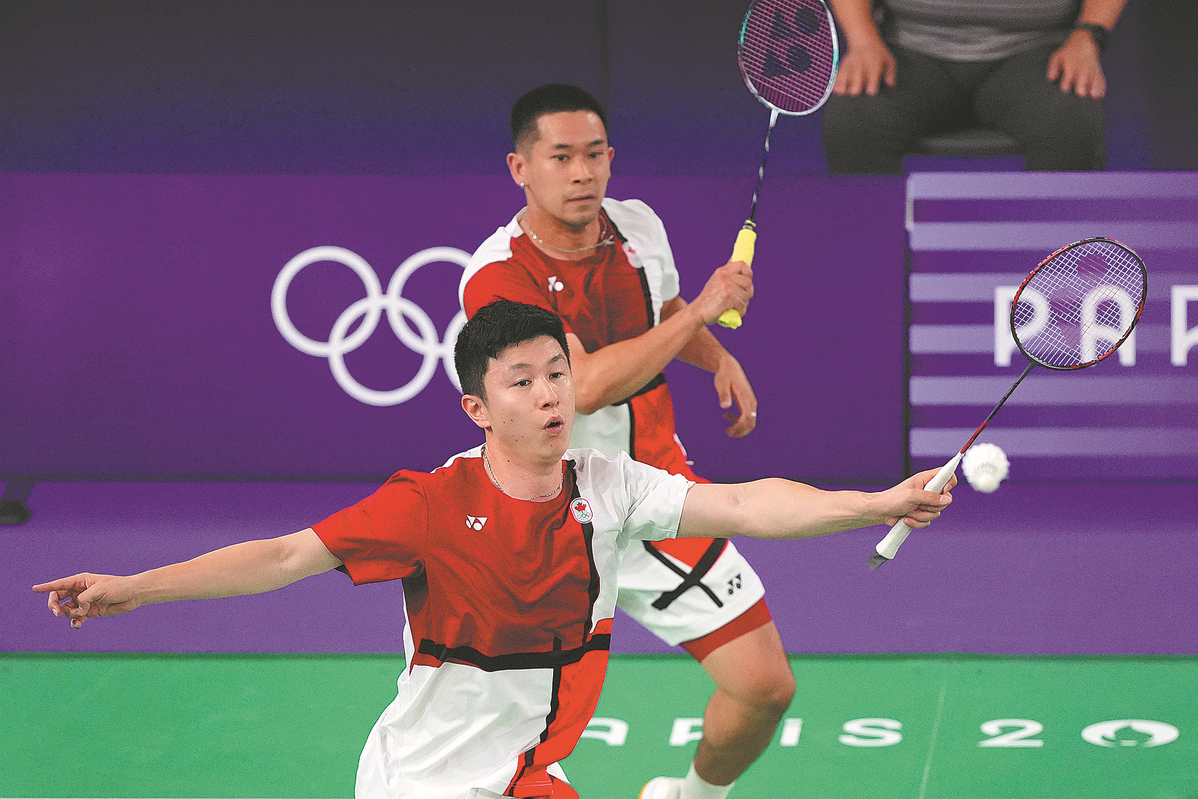


Along with records broken and medals celebrated, competing at the Olympics is more often littered with narrow defeats, last-gasp errors and mental meltdowns that build true character and sportsmanship.
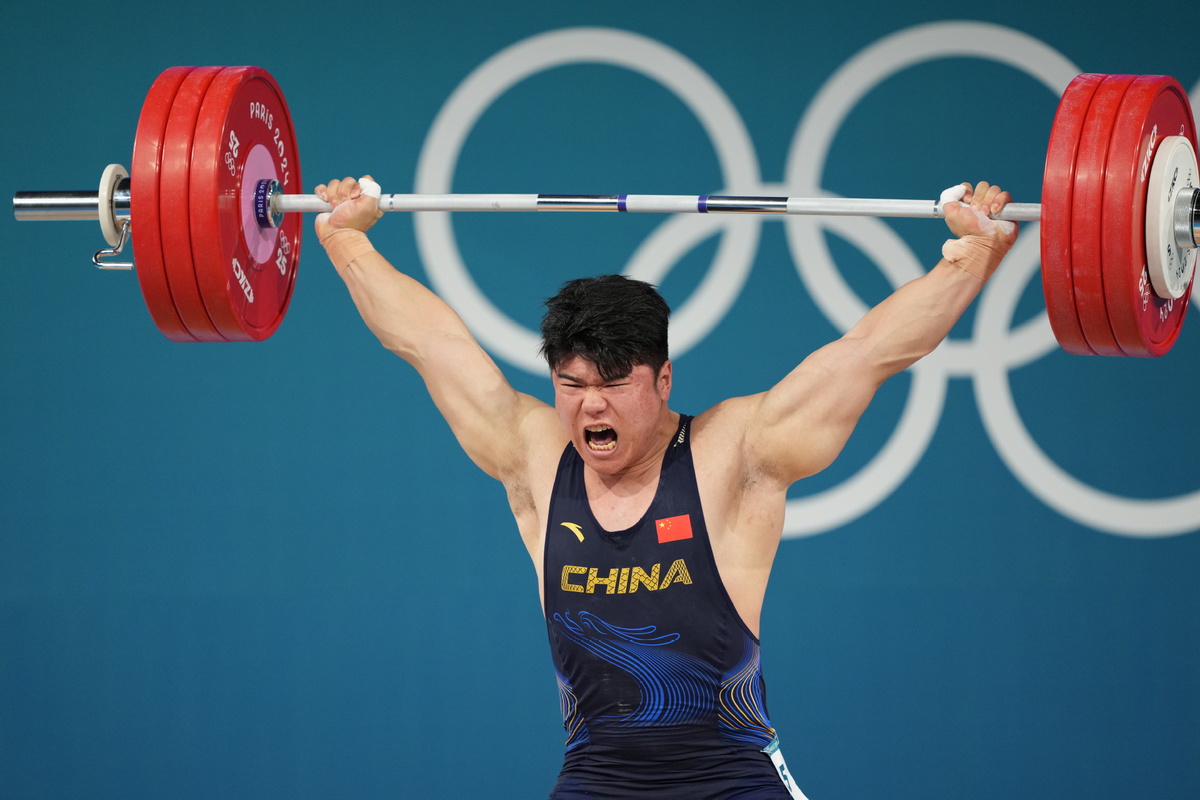
PARIS -- Chinese weightlifter Liu Huanhua claimed the men's 102kg gold medal at the Paris Olympics on Saturday in the South Paris Arena.
The 22-year-old lifted 186kg in the snatch and 220kg in the clean and jerk, achieving a winning total of 406kg to lift China's first Olympic title in men's heavyweight categories.
Liu, world record holder for both clean and jerk and total, completed his first attempt of 220kg in clean and jerk but failed his next two attempts at 228kg and 233kg. However, it was enough to secure China's 34th gold medal at the Paris 2024.
This also marks the fourth gold medal for the Chinese weightlifting team, following victories by Li Fabin, Hou Zhihui and Luo Shifang.
Akbar Djuraev of Uzbekistan took the silver medal with 404kg and the bronze medal went to individual neutral athlete Yauheni Tsikhantsou from Belarus with 402kg.
The women's 81kg and men's +102kg events will take place later on Saturday, while the gold medal for the women's +81kg division will be decided on Sunday, the final day of the Olympics.
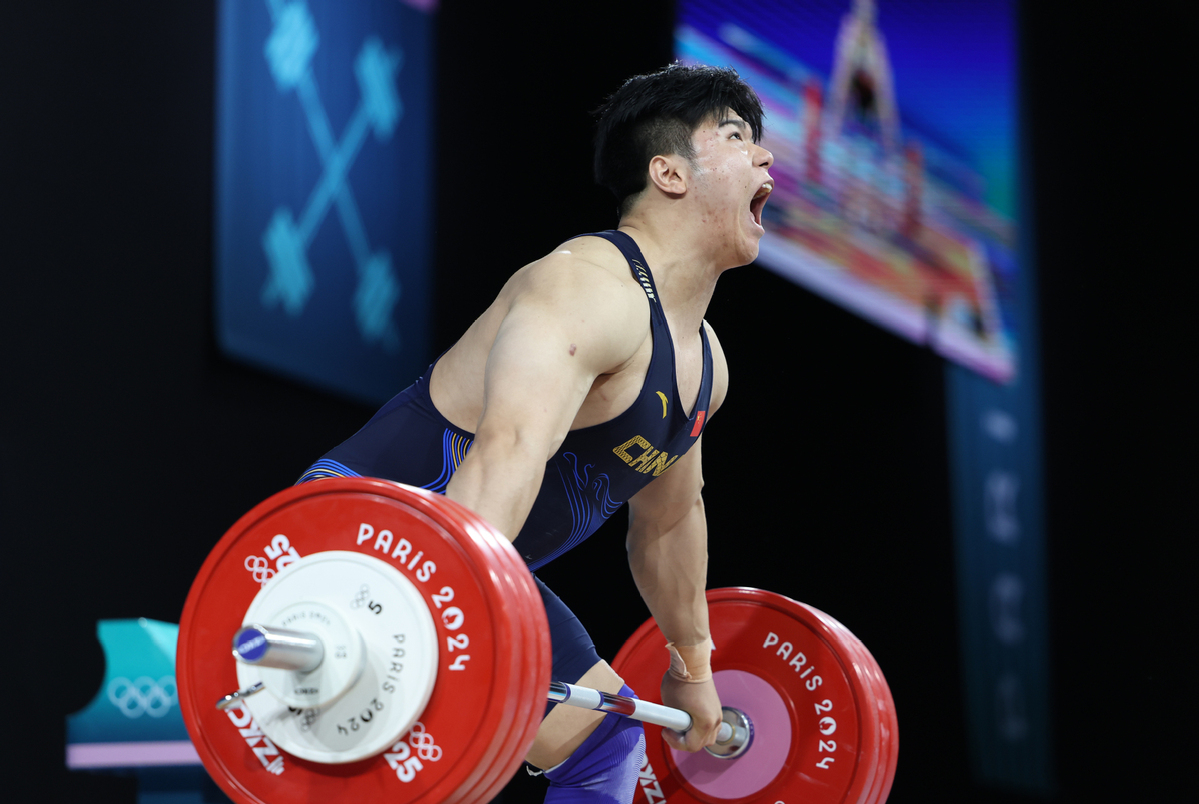
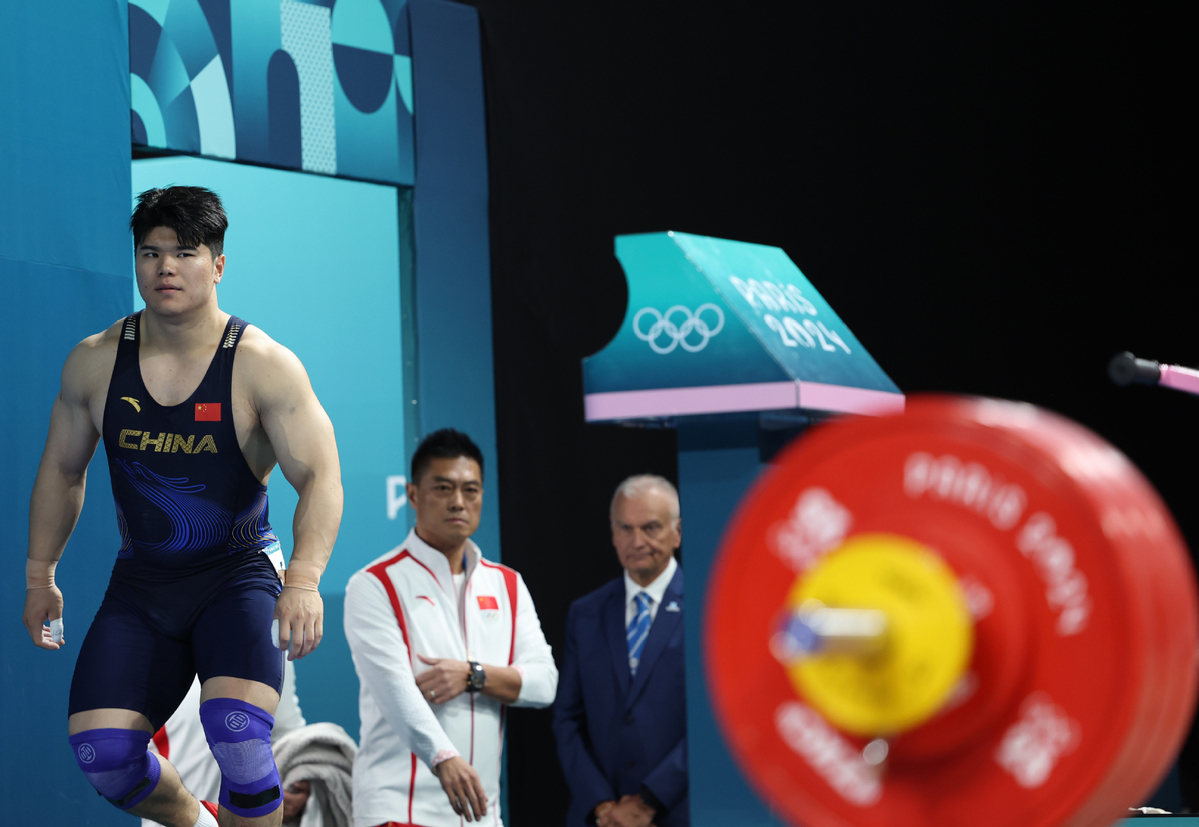
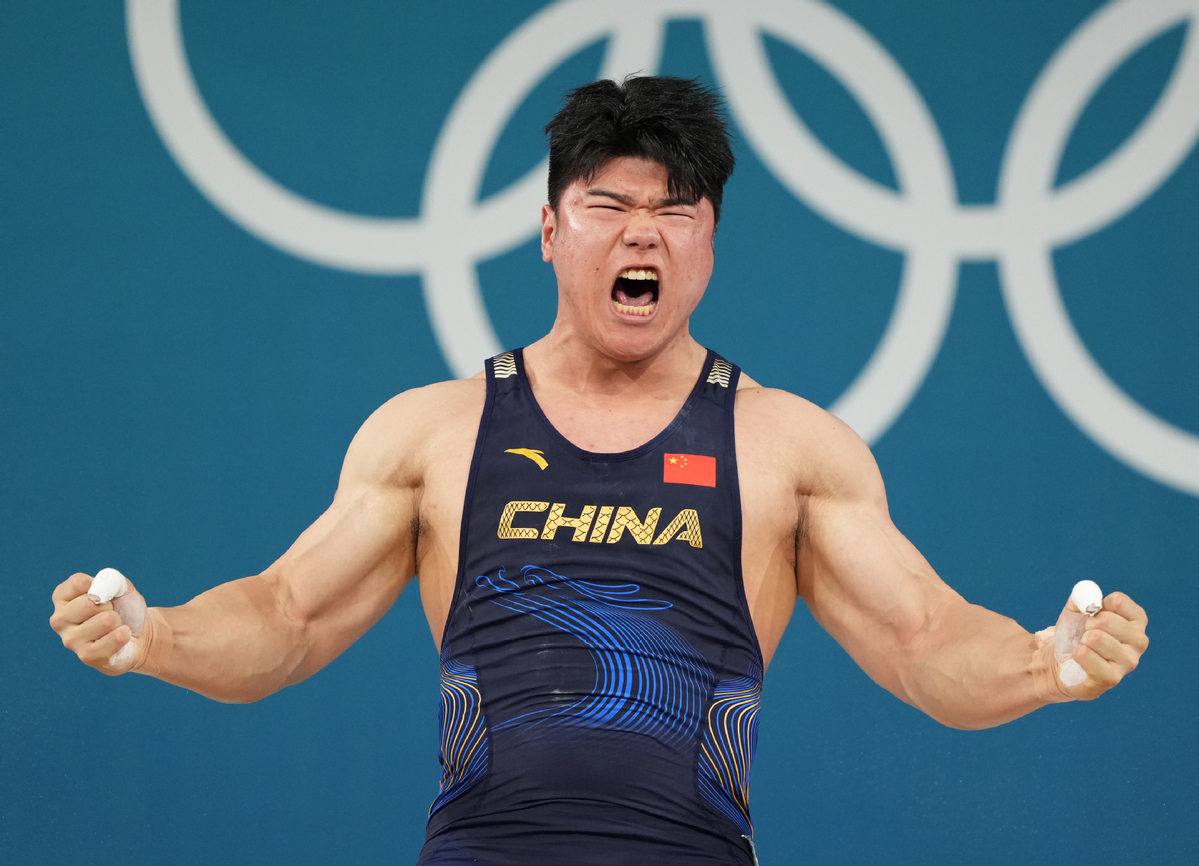

As the 2024 Paris Olympics draw to a close, two international students from Beijing University of Chemical Technology can't help but marvel at the pervasive presence of chemistry at the games.
Sofiane from Algeria and Maria from Angola, intrigued by the cutting-edge technology behind the athletes' performances, explored the chemistry secrets hidden in their equipment. They discovered that even seemingly ordinary items, like running shoes and tennis rackets, are powered by remarkable scientific innovations. Beyond that, they even tried making a cup of electrolyte water.
Curious about how chemistry enhances athletic performance and everyday life? Dive into the fascinating world of chemistry with us and watch the video!
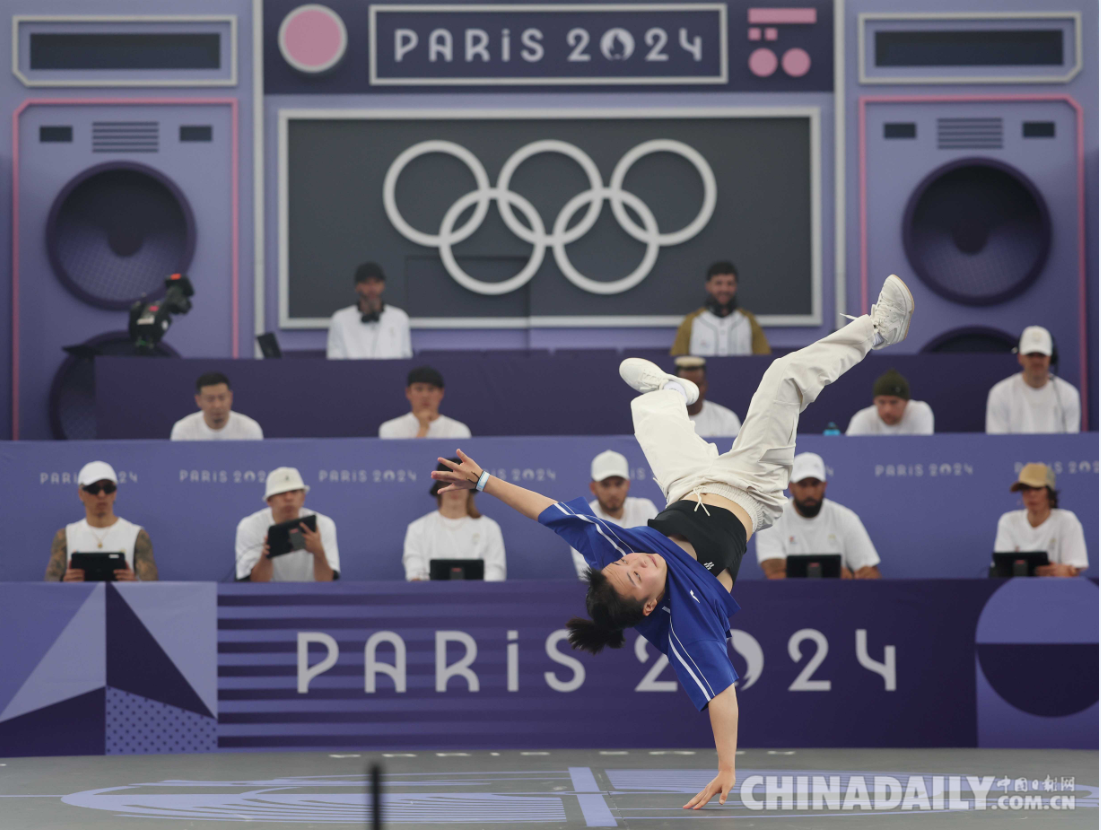
PARIS - The atmosphere was electric at Place de la Concorde in Paris as breakdancing - known at Paris 2024 as breaking - made its Olympic debut. In the women's event, Japan's B-Girl Ami (Ami Yuasa) captured the gold medal, while China's B-Girl 671 (Liu Qingyi) clinched the bronze.
B-Girl Ami, donning her oversized hoodie, signature baseball cap, and big earrings, dominated Group C after the round robin, defeating B-Girl Anti of Italy, Morocco's B-Girl Elmamouny, and China's B-Girl Ying Zi (Zeng Yingying), losing only two judges' votes.
The 25-year-old, a two-time world champion (2019 and 2022), advanced to the final after overcoming B-Girl Syssy of France and the Netherlands' B-Girl India in the quarterfinals and semifinals, respectively.
In a tightly contested final, B-Girl Ami secured more votes from the nine judges, all former breakdancing legends, defeating Lithuania's B-Girl Nicka 3-0 with a score breakdown of 16-11.
"I still feel like I'm in a dream," B-Girl Ami remarked after winning gold. Reflecting on the support from her home country, she said, "Before the Games, a lot of people back home cheered me on with 'good luck' and 'enjoy,' and I hope everybody was here."
She emphasized Japan's strong cultural and sporting affinity for breakdancing, adding, "[The atmosphere] was great every weekend at those gyms, both the big ones and the cool smaller ones." While she views breakdancing as her "artistic expression," B-Girl Ami added that she hopes to see the sport grow in global influence.

China's B-Girl 671 finished the round robin with a 2-1 record, her only loss coming against B-Girl India, who had qualified through Friday's Olympic pre-qualifier. The 18-year-old Hangzhou Asian Games gold medalist quickly rebounded, defeating Ukraine's B-Girl Kate 3-0 in the quarterfinals.
Despite losing to B-Girl Nicka in the semifinals, B-Girl 671 found her rhythm in the bronze medal match, securing a 2-1 victory over B-Girl India.
Although she admitted she wasn't "100 percent hyped by the electrifying Olympic atmosphere," B-Girl 671 expressed pride in her performance. "I tried my best," she said, adding, "I was aiming for the gold, but you know what happened in the semifinal. Being able to adjust quickly, pull myself together, and get into my zone for the third-place battle - that's something I'm truly proud of."
Reflecting on her journey to the Olympics, B-Girl 671 shared, "Throughout my preparations for the Olympic Games, I gained a deeper understanding of hip-hop and gradually developed my style."
Having trained for five years to reach the Olympic stage, she also highlighted the growing popularity of breakdancing in China, thanks to its inclusion in the Games.
Fellow Chinese athlete, B-Girl Ying Zi, finished eighth in the one-day competition.
IOC President Thomas Bach, World DanceSport Federation President Shawn Tay, and Beijing 2022 gold medalist freestyle skier Gu Ailing were among those present during the knockout rounds, adding to the vibrant atmosphere at La Concorde.
"It was absolutely amazing with the crowd and the passionate sport. I could feel it, especially sitting on the stage side," Gu told Xinhua.
Breakdancing was first introduced at the 2018 Summer Youth Olympic Games in Argentina, where the event attracted over one million viewers, demonstrating its appeal to younger audiences and sparking interest among older generations.
The sport was officially added to the Olympic program on December 7, 2021, though it is not currently scheduled to be included at the Los Angeles 2028 Olympic Games.
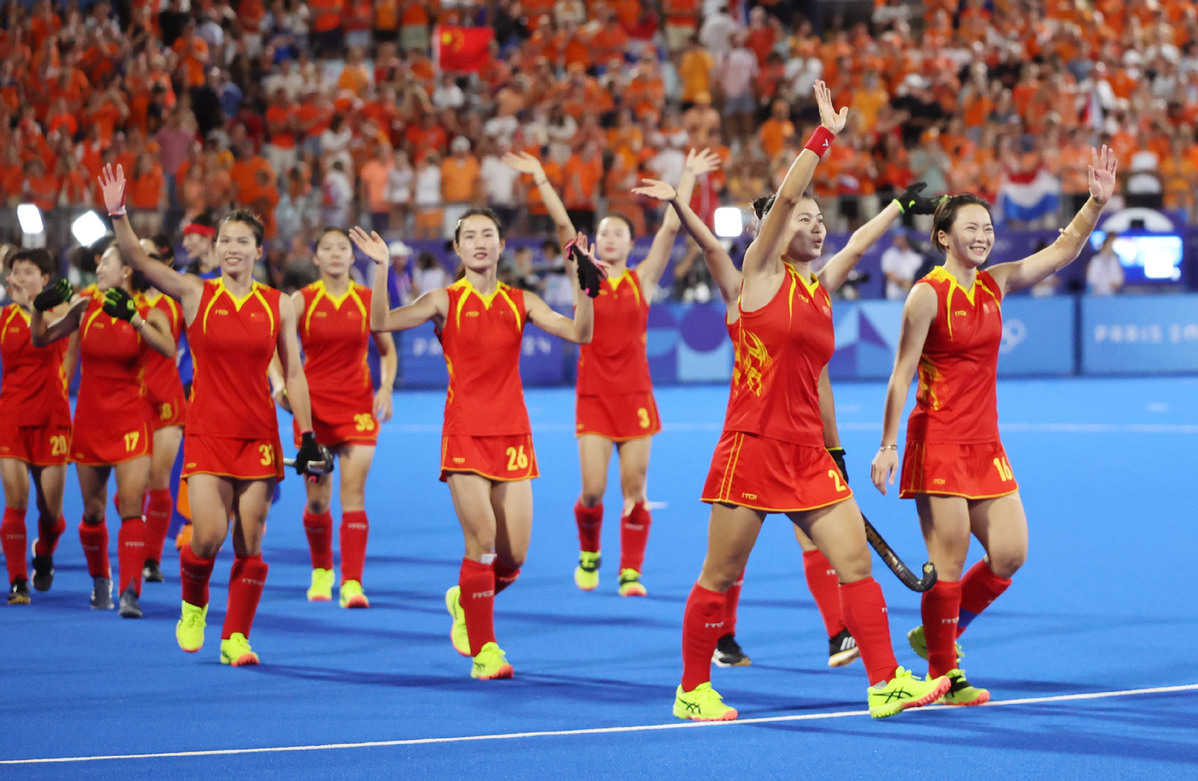
From the relative obscurity of being ranked 14th in the world in 2022 to almost becoming the new Olympic champions, China's women's hockey team confidently announced its arrival at the elite level of the sport when it equaled its Olympic best performance and finished runners-up in Paris on Friday.
Entering the knockout stage as its group's lowest-ranked qualifier, the Chinese women's squad proved it deserves as much respect as all the other world-class contenders when it almost managed to knock defending champions the Netherlands off its golden throne in the final on Friday night in the Yves-du-Manoir Stadium in the western Paris suburbs.
Almost, and to be precise, the victory was just eight minutes away.
After starting the final with an early goal in the sixth minute by forward Chen Yi, Team China, the sixth-ranked squad in the world at the start of the tournament, had to fall back and defend as the Netherlands piled on the pressure throughout the following three quarters, forcing China to fend off its surging attacks with a brave collective effort.
The top-ranked Netherlands team eventually scored a 52nd-minute equalizer, with Yibbi Jansen netting via a penalty corner and leveling the score close to the end of the 60-minutes of regulation time.
Having already survived a shootout in the knock-out stage during its semifinal win against Belgium on Wednesday, Team China ran out of luck after converting only one of its five attempts while conceding three goals, losing 3-1 in the tiebreaker.
Applauded by its opponents and cheered on by many of the orange-clad fans on the stands, the Chinese team jumped onto the podium during the medal ceremony as proud as the winners on the top step.
It was all about honor and pride, instead of disappointment and frustration, said Team China's head coach Alyson Annan.
"We regret nothing. We knew that today was going to be difficult, playing against the No 1 in the world. We took them to the shootout. We can only be proud (of ourselves)," said Annan, an Australian legend in the sport who took over the Chinese team in 2022.
"I am not surprised. About six months ago, we kind-of figured that if we were doing all the right things that we could be here," said Annan, who guided Team China to sixth place in the global rankings prior to Pairs from 14th in the International Hockey Federation rankings when she was appointed.
"We were confident that we were doing all the right things in our training and we were progressing the way we should be. So we knew we were on the right track," she added.
It was the Chinese women's second Olympic silver medal, and the first achieved at an overseas edition of the Games, the first having been won on home soil at the 2008 Beijing Games.
After returning to the Olympic podium and mainstream exposure 16 years later, the Chinese players now hope their hard-fought achievement will draw more attention to the otherwise niche sport in China.
"We came so close. It was just a near miss that we felt a little bit regretful. But we are so proud to give the sport another opportunity to be seen and be followed," said Team China's captain Ou Zixia.
"We've caught up with the world best. I hope this medal will inspire more young people to grow interest in hockey and try it themselves. I also wish the younger generation could carry on with what we did and grow their level further than we did," said the veteran defender, who has represented China in 174 international matches across three Olympic Games.
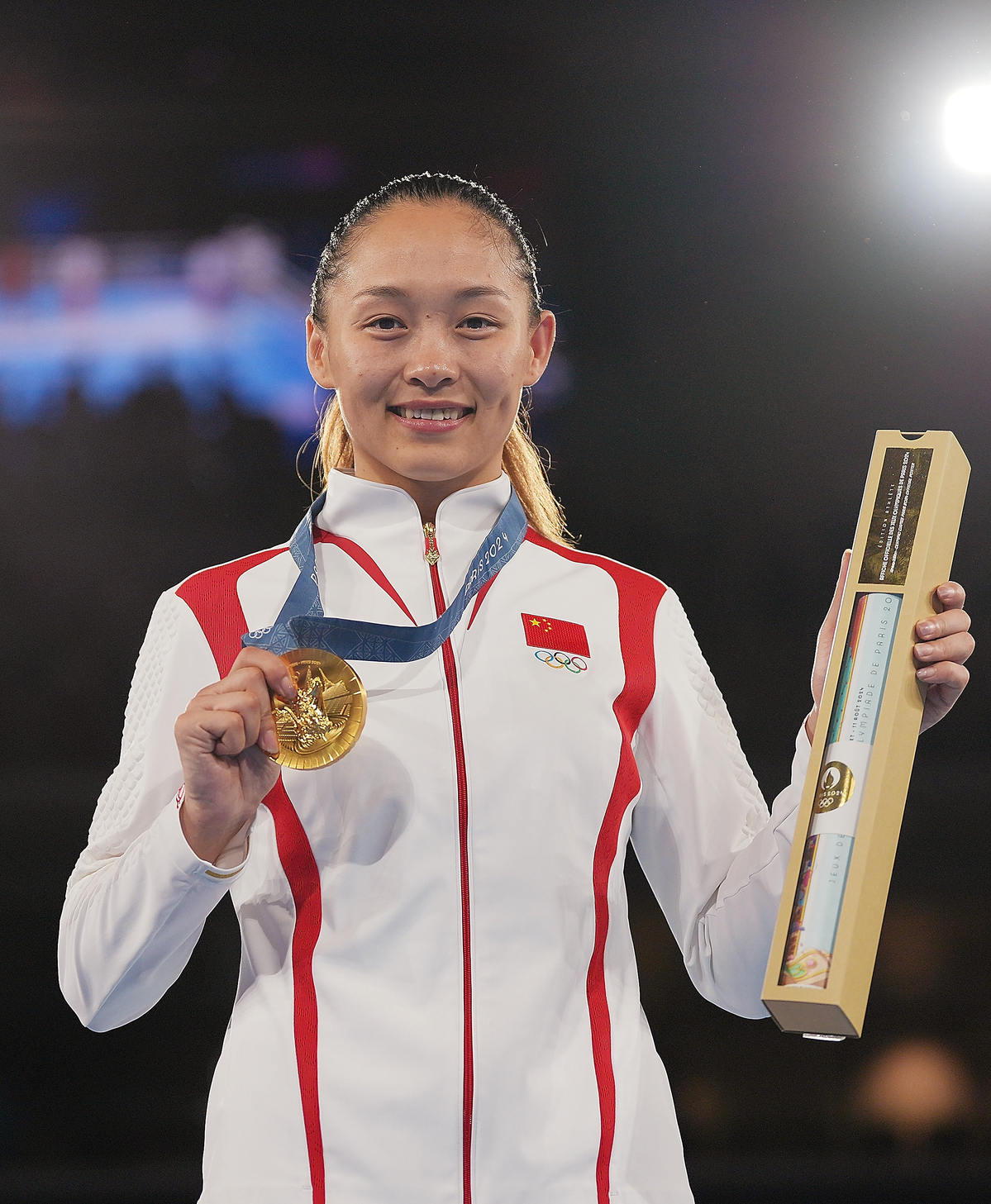
Quiet, elegant and ferocious all in one — Chinese female boxer Chang Yuan put feminine ferocity on full display in the Olympic ring by claiming a historic gold medal to boost the sport's profile in her country.
Roland Garros Stadium in Paris witnessed a "first" for Chinese sports again on Thursday night as Chang punched her name into the history books after defeating Hatice Akbas of Turkiye via a three-round unanimous decision to win the country's first women's Olympic boxing title in the 54-kilogram division.
Chang's golden effort was celebrated just five days after Chinese tennis ace Zheng Qinwen won the country's first singles Olympic title at the same venue, Court Philippe-Chatrier, and the breakthrough has lived up to the renowned aphorism emblazoned on the arena's upper deck — "Victory belongs to the most tenacious" — a rousing slogan often attributed to emperor Napoleon Bonaparte.
"All the sweat and blood, injury and defeat that I've endured on my way over the past 15 years has paid off. I am just so excited and speechless now," said Chang, a 27-year-old native of Hebei province, who started boxing at 12, influenced by her martial-arts-loving father.
"At Roland Garros, tennis players have seen the national flag rise, and this time, it rose because of me. I feel very proud and honored."
Now, as China's first female Olympic gold medalist in the sport, Chang expects to send a message with her bouts.
"Boxing can make women more confident because women are perceived as more fragile in terms of shape or strength. But boxing is an excellent sport for women to show their toughness, strength and beauty," said Chang, whose breakthrough sparked rousing reactions across China's boxing community on Friday.
Notable figures, such as Zou Shiming, a two-time men's light-flyweight Olympic champion, and Xu Can, a former WBA world featherweight belt holder, posted congratulations to Chang on social media, sharing their excitement about the inspiring momentum for women's boxing created by Chang's golden bout.
It was the Chinese delegation's second boxing medal at the Paris Olympics, following Yang Wenlu's silver finish in Tuesday's 60kg bout, and the world-leading ninth overall women's boxing Olympic medal achieved by Chinese mainland athletes since 2012.
"I made many changes. Mentally, I'm not as stressed out, I'm not as impatient, so in my preparations I've really made sure I remain calm, and I was more in control of my emotions," Chang said of her improvements since her quarterfinal loss at the Tokyo Games three years ago.
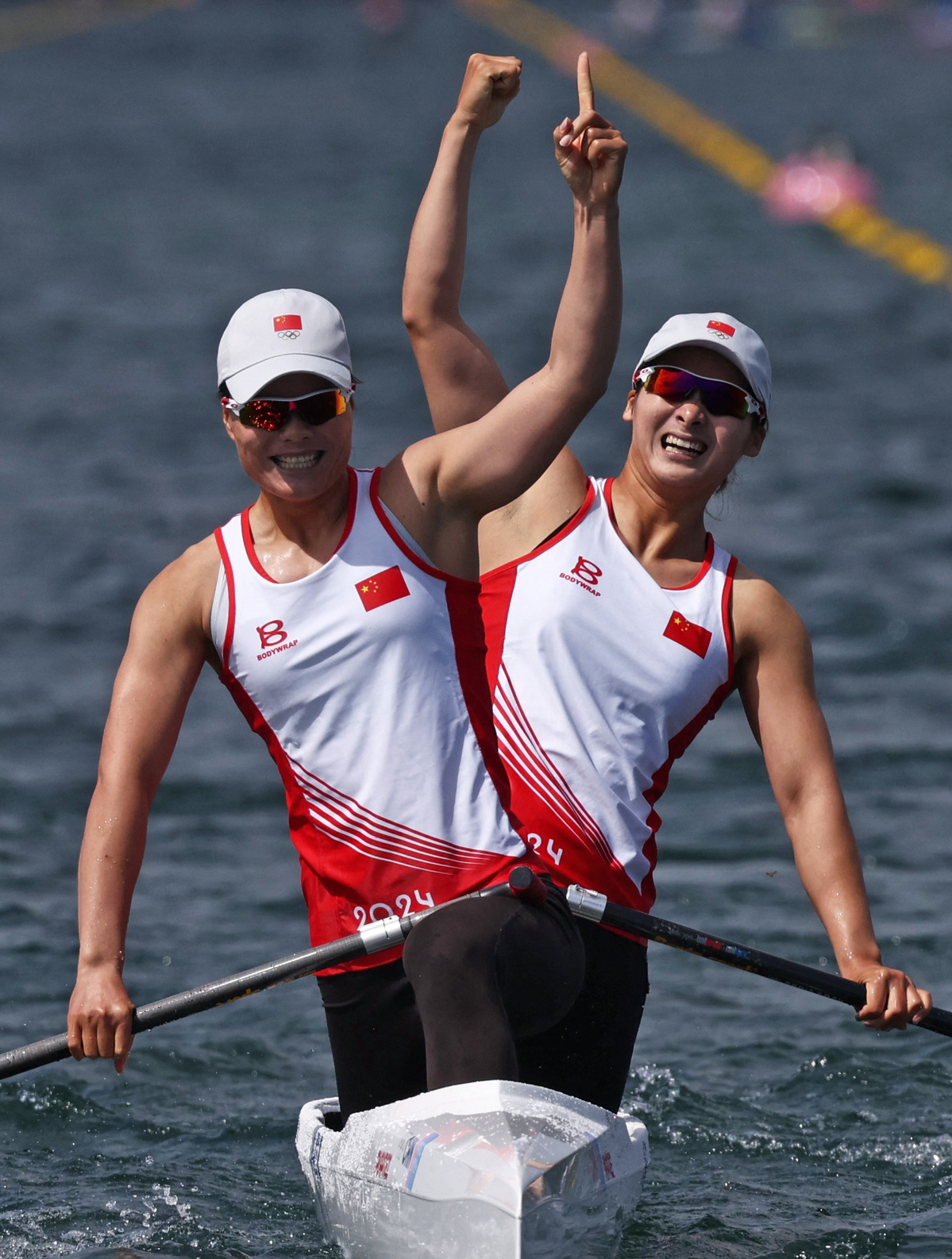
Hours after fans in Beijing celebrated Chang's win Friday morning, another pair of Chinese female athletes — paddlers Xu Shixiao and Sun Mengya — kept the momentum going by defending their Olympic gold medal in the women's canoe sprint double 500m after they finished first in a new Olympic best mark of one min 52.81 sec at Vairessur-Marne Nautical Stadium.
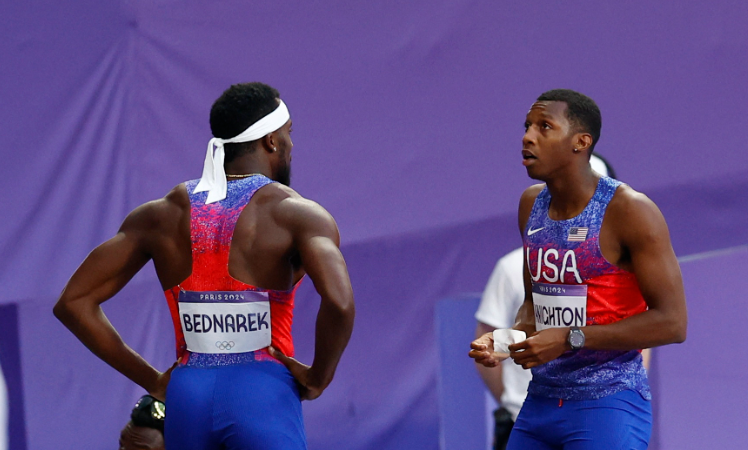
The International Olympic Committee has reaffirmed its commitment to ensure a "good and robust" global anti-doping system as the US anti-doping agency's cover-up of drug violations is deepening fair competition concerns.
The United States Anti-Doping Agency has been embroiled in controversy due to an accusation that it allowed athletes to compete after testing positive for performance-enhancing drugs and worked undercover to glean information on other violators from 2011 to 2014. The practice was first reported by Reuters on Wednesday.
The World Anti-Doping Agency responded on the same day, saying that the tactic was not allowed and was against its global code. It also denounced the USADA's action of suspecting other countries' regulatory bodies while breaching international rules itself.
Asked about the scandal during a news conference on Thursday, IOC spokesman Mark Adams said, " Obviously, we're working with all of our stakeholders … to make sure that we have a good and robust world anti-doping system."
The revelation of the US tactic has raised more questions over the nation's handling of doping cases and undermined trust in its capability to preserve transparent and fair competition, Xinhua News Agency reported.
US sprinter Erriyon Knighton finished fourth in the men's 200-meter final at the Paris Olympics on Thursday. He tested positive for the banned substance trenbolone this year but was not suspended from the Games because the result was likely caused by contaminated meat.
As suspicions linger over his case, reporters rushed to the zone Knighton was required to pass through after the race and found no sign of him. His fellow teammates were seen speaking with reporters as usual.
"Knighton's silence is particularly striking given the ongoing scrutiny of doping practices. Questions remain as to why the typically outspoken Knighton has chosen not to address the media, leaving the doping controversy surrounding him unresolved in the public eye," Xinhua quoted an unnamed expert as saying.
Xinhua also reported on Friday that athletes, sports administrators and media outlets from multiple countries have questioned the antidoping work of the US following the Reuters report.
Questions have revolved around the nation's criteria for listing a drug on the banned substance list, the anti-doping testing regimens for the majority of US athletes in the professional leagues and college sports who do not compete under the global code, and the potentially negative impact of a US anti-doping law called the Rodchenkov Act that could disrupt the global harmonization of rules.
"The US' practice of allowing athletes who had doped to compete has threatened the integrity of sports competitions. Is it fair for other athletes on the stage?" said the Xinhua report.
China Global Television Network released the results of a survey involving nearly 15,000 netizens on Friday, showing that about 96 percent of global respondents believe the USADA has engaged in coverups and exonerated domestic athletes who were caught doping.
"As many as 96.23 percent of survey participants strongly demand increasing test frequency for US athletes so as to rebuild confidence in fair competition," said the survey.
Moreover, nearly 94 percent of respondents expressed concerns about whether doping tests at the 2028 Los Angeles Olympics can guarantee fairness and transparency, the survey added.
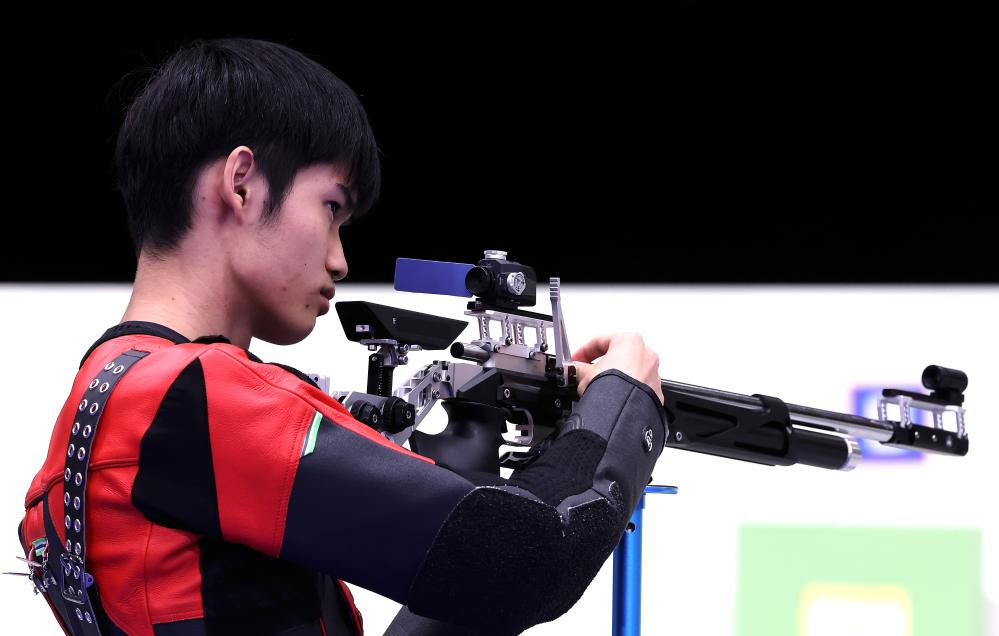
In late July, when Chinese sharpshooters Sheng Lihao and Huang Yuting delivered under pressure to win the first gold medal up for grabs at the Paris Olympics in the 10-meter air rifle mixed team event, Fu Qiang was more excited than most.
Fu, 65, the founder of Zhuhai Qiangyuan Sports Goods Co, was proud that the winning air rifle bullets — the QYS brand used by Sheng and Huang — were produced by his company.
A native of Zhengzhou, Henan province, Fu said his high-quality bullets are currently in wide use by both Chinese and foreign competitive shooters. The company can now produce around a billion bullets annually.
In 2000, the bullets quickly achieved a 100 percent market share domestically. The Chinese shooting team began to use them in training that year and later adopted them for competitions because of their proven superior accuracy.
Xu Haifeng, China's first Olympic gold medalist in 1984, was head coach of the Chinese shooting team when the bullets came on the market. He described how the team had been using foreign-made bullets because domestic products could not compete. He said he was pleased when the high-grade QYS brand became available.
Fu recalled: "As the performance of the Chinese shooting team improved, foreign athletes took notice and started using our bullets at the Olympics and major global competitions."
Many overseas athletes have now won medals in major shooting competitions for their countries using the QYS brand. Those events include the Olympics, the World Cup and the World Championships. Fu said he knows this because he could see the boxes, labels and packaging in videos, and he could track their purchase channels.
QYS air rifle bullets have been sold in more than 50 countries and regions around the world, he said. Top shooters acknowledge the accuracy of the brand, which exceeds the previous favorite, which was manufactured in Germany.
Fu established his company in 1994 after he learned that Team China was using the German bullets.
"At that time, people poured cold water on me, telling me not to think about impossible things. You can't surpass Germany," he said. But his strong self-confidence and imagination took over.
It took time to perfect the process, Fu said, noting that the accuracy of the first batch of bullets he produced was far inferior to those from Germany. He modified the design and purchased two machines — using manual methods to improve their accuracy.
The Henan Provincial Shooting Team provided Fu with great support by using his bullets, he said.
After multiple improvements over two or three years, sales of Fu's bullets in China were on par with the German ones.
"But for competitive sports, no athletes will use products unless they are the highest quality, especially for the Olympic Games, which are held every four years. They don't want to waste precious opportunities," he said.
After another five or six years of improvement and development, Fu's bullets were finally adopted for use by the Chinese shooting team at the Olympics.
In 2002, Fu moved his company from Zhengzhou to Zhuhai, Guangdong province, and established Zhuhai Qiangyuan Sports Goods Co to meet growing market demand. The company was among the first designated civilian firearms and ammunition production enterprises to be approved by the Ministry of Public Security.
Fu said the company is now preparing to enter the foreign civilian air gun bullet market.

As the 2024 Paris Olympics draw to a close, all eyes are on the final medal count. And this year, the Olympic medals hold special significance, paying homage to one of France's most iconic landmarks — the Eiffel Tower.
Charles Leung, CEO of French luxury jewelry brand Chaumet, shares the intriguing story behind the medal's striking appearance."The Olympic committee gave us a very special brief — to create a medal that has never been seen before in Olympic history, one that would make France shine on the global stage," Leung told China Daily.
Chaumet's storied history with the French royal family made them the natural choice for this prestigious commission. "More than 240 years ago, when Napoleon was crowned, he came to Chaumet for his coronation crowns. We've had the honor of designing tiaras and crowns for the French royal court over the centuries," Leung explained. "So when there was something this important for France, the country turned to us again."
Chaumet's opportunity to design the medal for the 2024 Paris Olympics was largely due to its parent company, LVMH Group, a premium partner of the global sporting event.

Antoine Arnault, head of image and environment at LVMH, emphasized the significance of the 2024 Paris Olympics. "It's an exceptional event that hasn't been held in France for 100 years, one of the most closely followed in the world, and it's taking place in the city where most of our maisons were born," Arnault said. He added that as the leading French group, being involved in the Paris Olympics "was not only an obvious choice, but also a responsibility".
Chaumet's design team set out to integrate the Eiffel Tower into the medal's structure, using recycled steel bars from the iconic landmark itself. "The Eiffel Tower was originally meant to be a temporary structure for the 1889 World's Fair, but it was such a sensation that Paris decided to keep it," Leung said.
"The issue was that the material was not good enough to last for so long. So what happened was that, over the years, little by little, bar by bar, section by section, the original metal framework has been replaced with stronger steel to ensure the tower's longevity."
Chaumet's designers had the idea of cutting the Eiffel Tower steel into a hexagonal shape, as it holds deep symbolic meaning for the French."The hexagon represents the shape of France itself," said Leung, adding that it also evokes the image of the humble but hardworking bee, which the French have long associated with national unity and industriousness.
Adding this slice of Parisian history into the medal's core was a delicate process. "We wanted each athlete to be able to bring home a piece of the Eiffel Tower, a tangible connection to the host city that would stay with them forever," Leung explained. The team carefully engineered the setting to showcase the recycled metal, surrounding it with a sunray pattern that radiates outward.
Strict specifications
Leung also said the designers had to meticulously adhere to the Olympics' strict specifications. "The weight, thickness and other technical details had to be perfect. This is not just another piece of jewelry — it's a prize that carries immense meaning and prestige," he said.
Additionally, the design incorporates France's rich history of world fairs. "The Eiffel Tower was actually built as a temporary structure for the 1889 World's Fair. That was the first time Chinese migrants came to Paris," he said.
Leung reflected on the honor of crafting these unique medals. "This is one of the most prestigious orders we've ever received, second only to Napoleon's crown. However, that was for personal use. We believe these medals will become the most beautiful jewels ever crafted by human hands," he said.
"These medals can't simply be bought. They must be won, earned through an arduous journey filled with sweat, tears, successes and failures. It requires the love and support of an entire community to achieve."
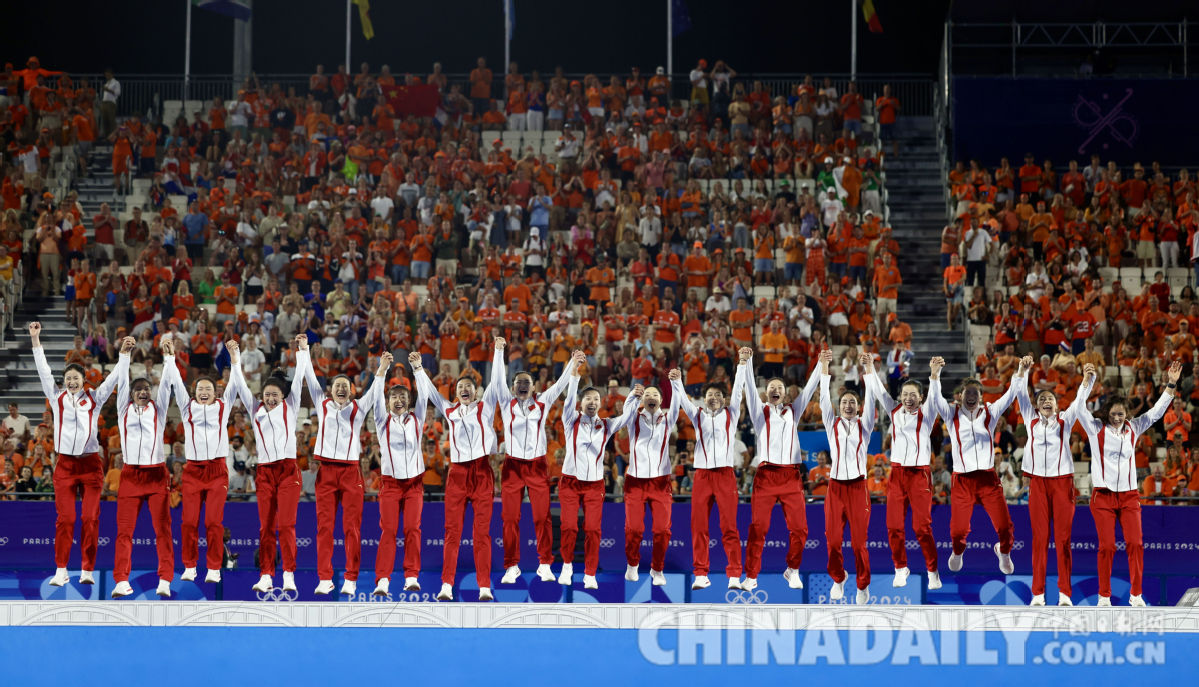
China took silver in the women's hockey tournament at Paris Olympic Games on Friday, ensuring the team equaled its performance at the Beijing Olympics in 2008. The Netherlands defended their title, besting China 3-1 in a shootout after a 1-1 draw in regular time.
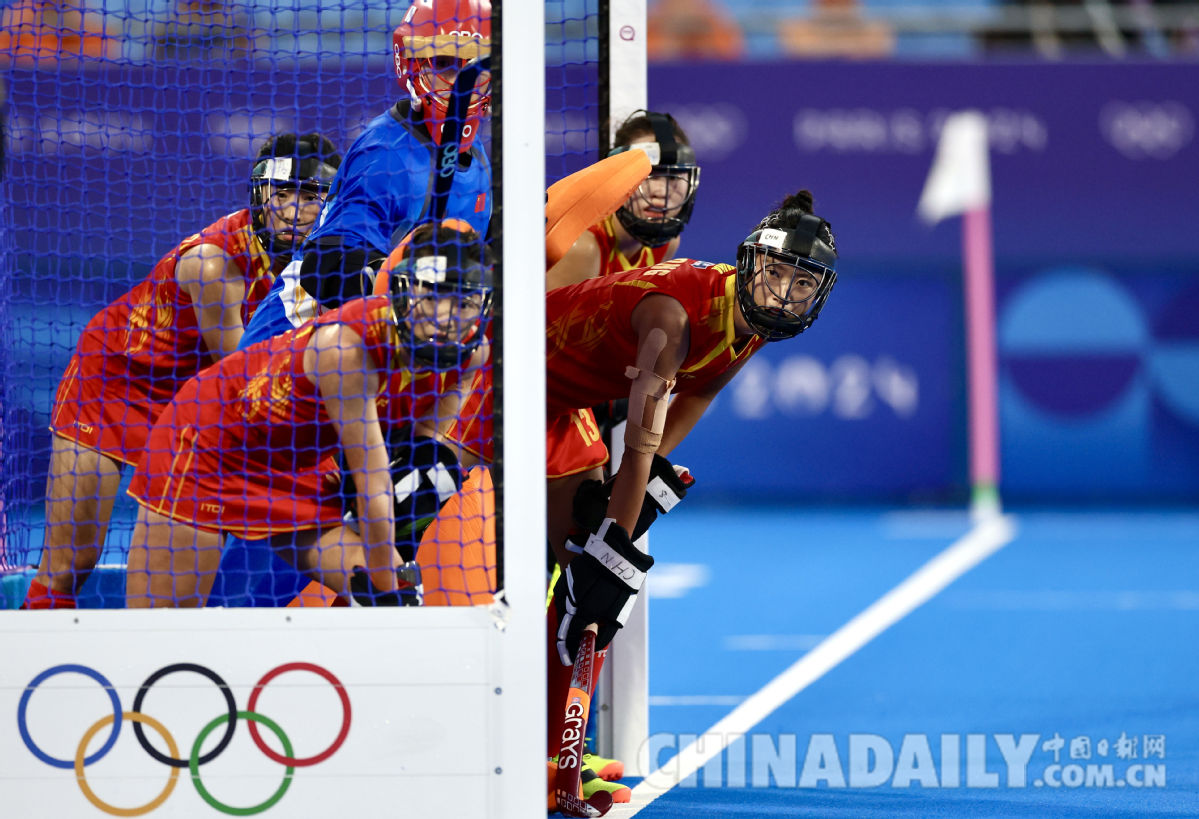


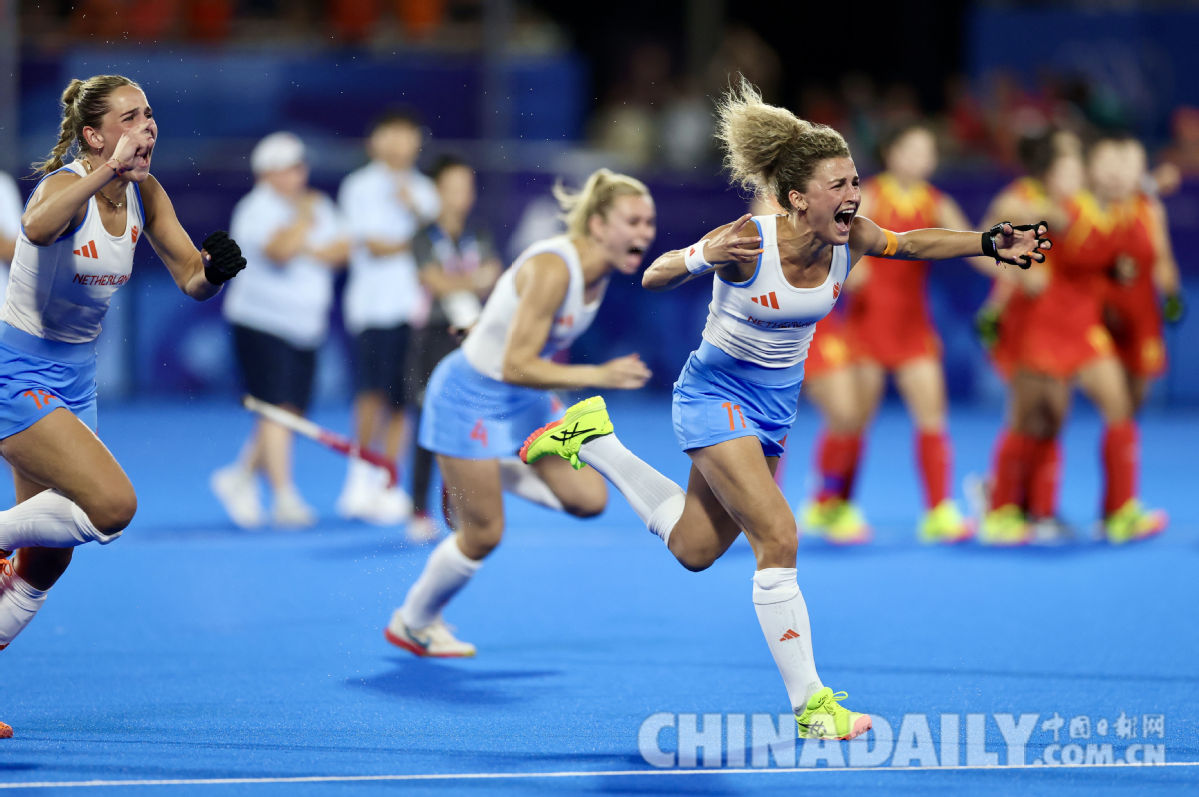

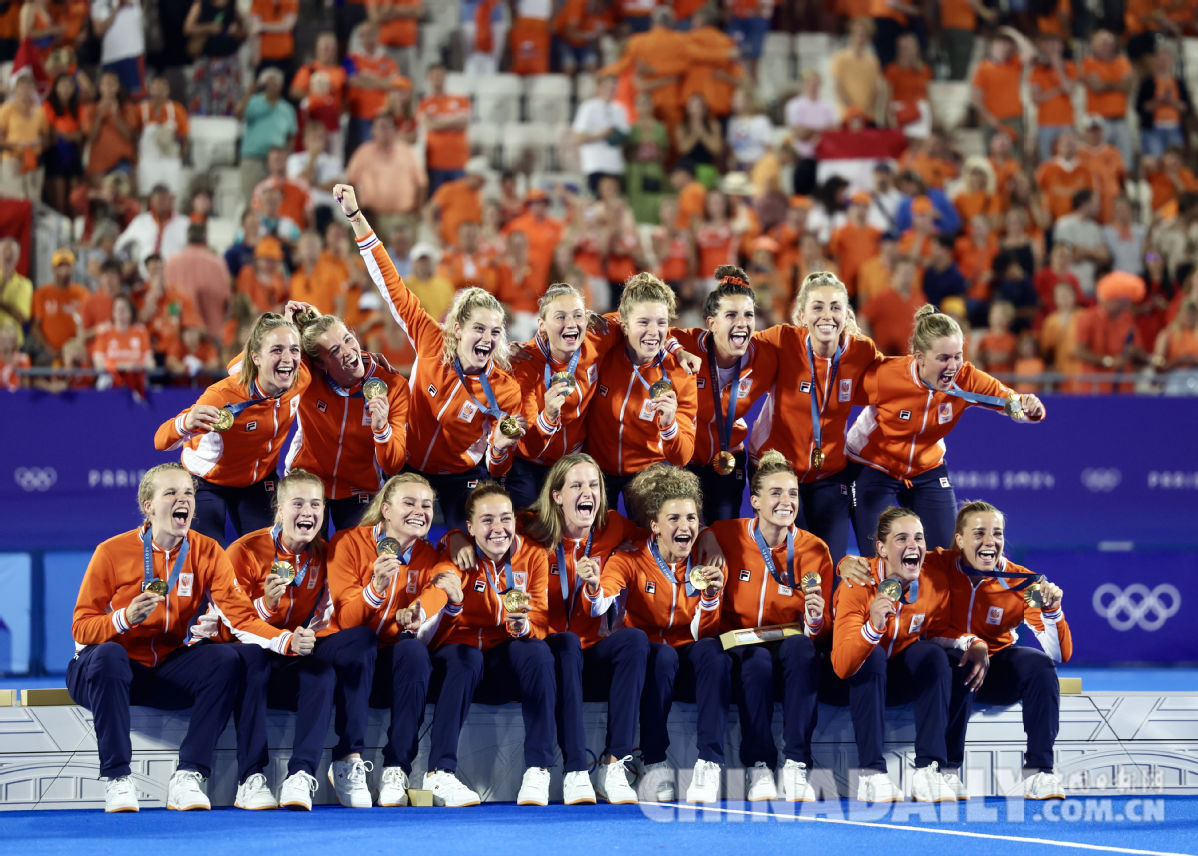
Chinese boxer Wu Yu won women's 50kg gold medal in Paris 2024.

PARIS -- China's men's table tennis team defended their Olympic title at Paris 2024 after crushing Sweden 3-0 on Friday.
With their star trio of Ma Long, Wang Chuqin and Fan Zhendong, China triumphed after a sequence of one doubles and two singles matches against Sweden's Anton Kallberg, Kristian Karlsson and Truls Moregard, each ending in a narrow 3-2 victory at the South Paris Arena.
The victory marks China's fifth consecutive men's team title since the event was introduced at the 2008 Beijing Olympics, solidifying their supremacy in the sport.
Ma, reflecting on the Paris Olympics, highlighted this final as his most memorable rivalry. "The Swedish team has been one of China's key rivals for decades. So we prepared extensively for the final."
Earlier in the day, France secured the bronze medal by defeating Japan, marking the host nation's first-ever medal in team table tennis.

With China's men's team winning gold, 35-year-old Ma has now become the most decorated Chinese Olympian, amassing six gold medals.
"The past 12 years have been a journey of highs and lows, and I'm incredibly grateful. I've played various roles in each Olympics," the veteran player shared.
"After Tokyo, I didn't expect to be here in Paris, but these three years have helped me grow both mentally and technically," he said.
Ma also announced that the Paris Olympics would be his last Games. "This gold medal is a perfect conclusion to my Olympic journey."
"But you might still see me on the international table tennis stage in the future," he added.
Having already secured gold in mixed doubles, men's and women's singles, and now the men's team event, China are poised to sweep all five table tennis golds at the Paris Olympics, with only the women's team final remaining on Saturday.

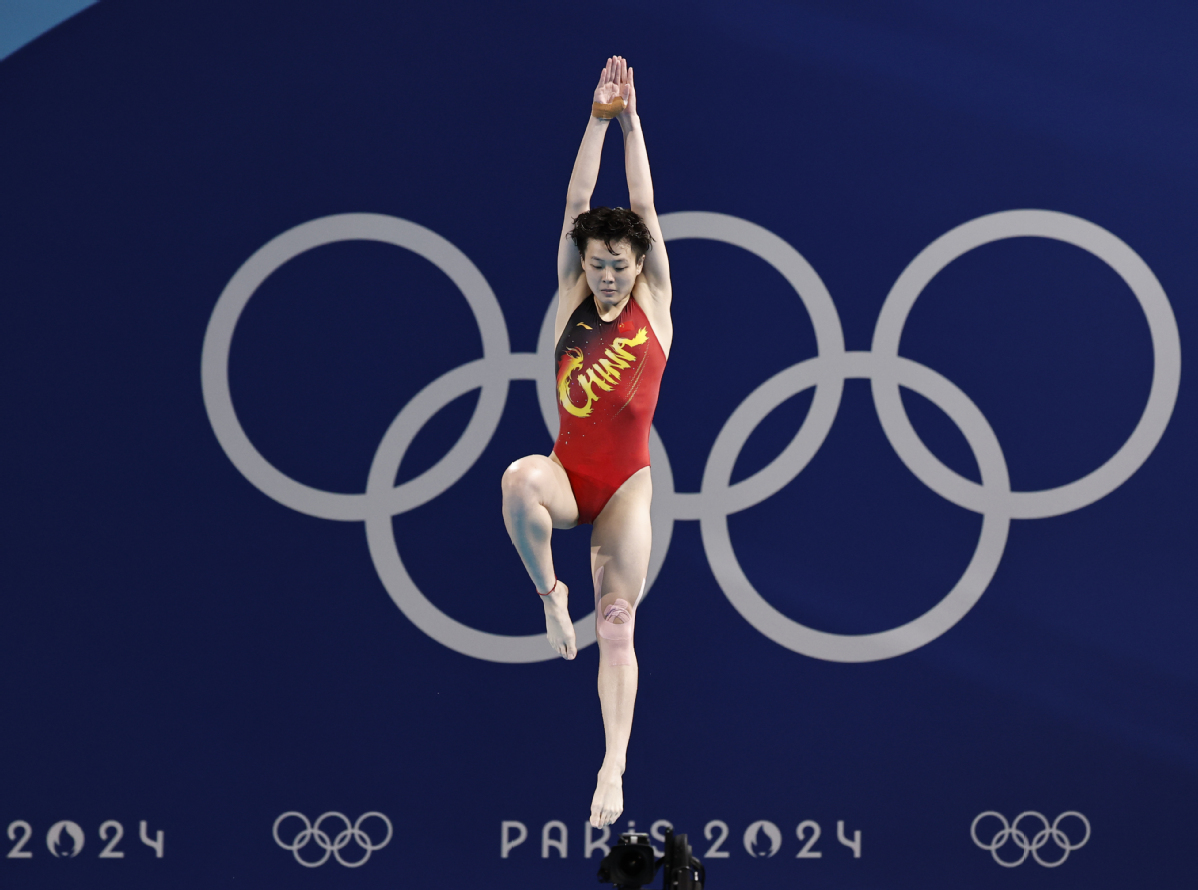
PARIS -- Chinese diver Chen Yiwen added the women's 3m springboard gold to her synchronized title here on Friday, winning the seventh gold for the Chinese diving dream team at the Paris Olympic Games.
Chen, 25, leading all through since the first round, collected a total of 376.00 points for her second Paris title.
Chen's teammate Chang Yani finished third with 318.75. Australian diver Maddison Keeney won the silver medal with 343.10 points.
Chang, who paired up with Chen to clinch the synchronized title, made a disastrous start as she only earned 42 points from her first dive.
But the 22-year-old reigning world champion kept her composure to come back from the last position in 12 divers to a podium finish.
The 2022 and 2023 world champion Chen dominated the event since the preliminary round and met no challenge all the way.
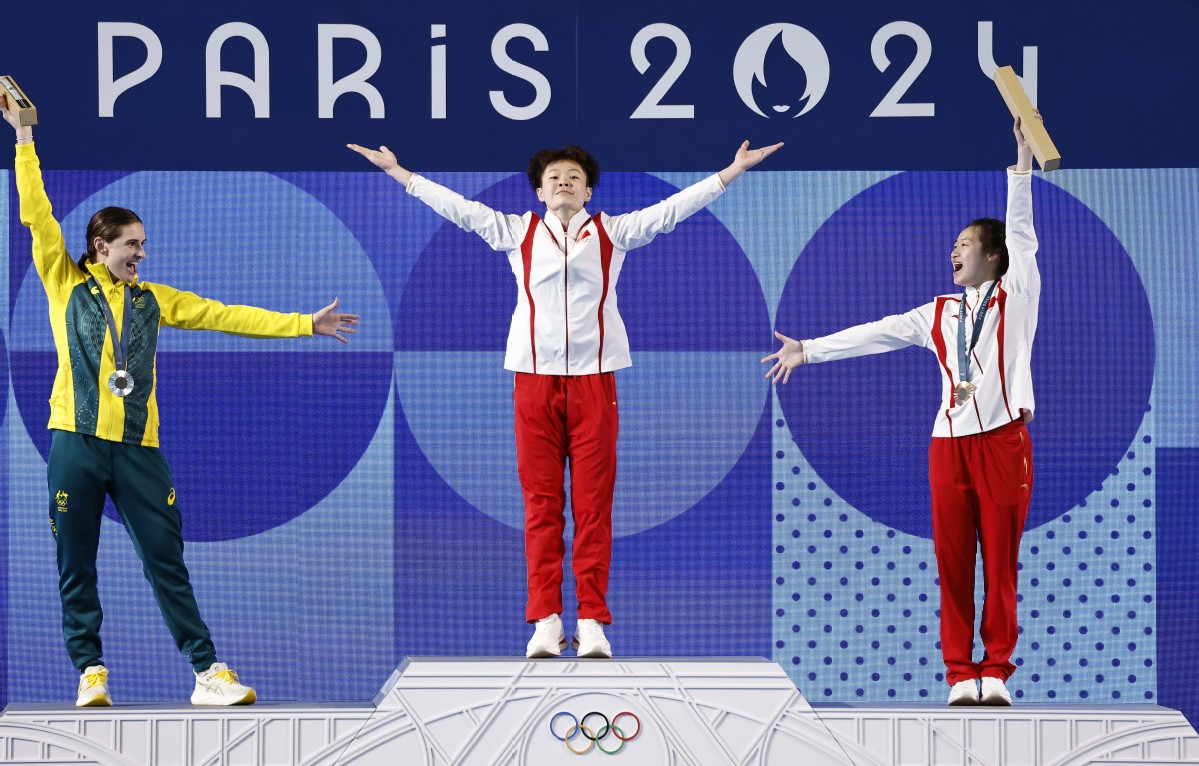
The Olympics return to Paris after a century, reigniting the inspiring spirit of "Faster, Higher, Stronger — Together". The addition of "Together" to the Olympic motto in 2021 emphasizes the unity and solidarity shared by people across the globe.
During the momentous time, not only do athletes shine, but everyday people from different countries also gather together in Paris, celebrating the Olympic spirit, the vibrant culture of the city, and friendship that transcends race, language and borders.
Immerse yourself in the lively atmosphere of the Olympics and the charm of Paris through our street interviews. Listen as our interviewees share their heartfelt wishes for the Games and the Sino-French friendship.
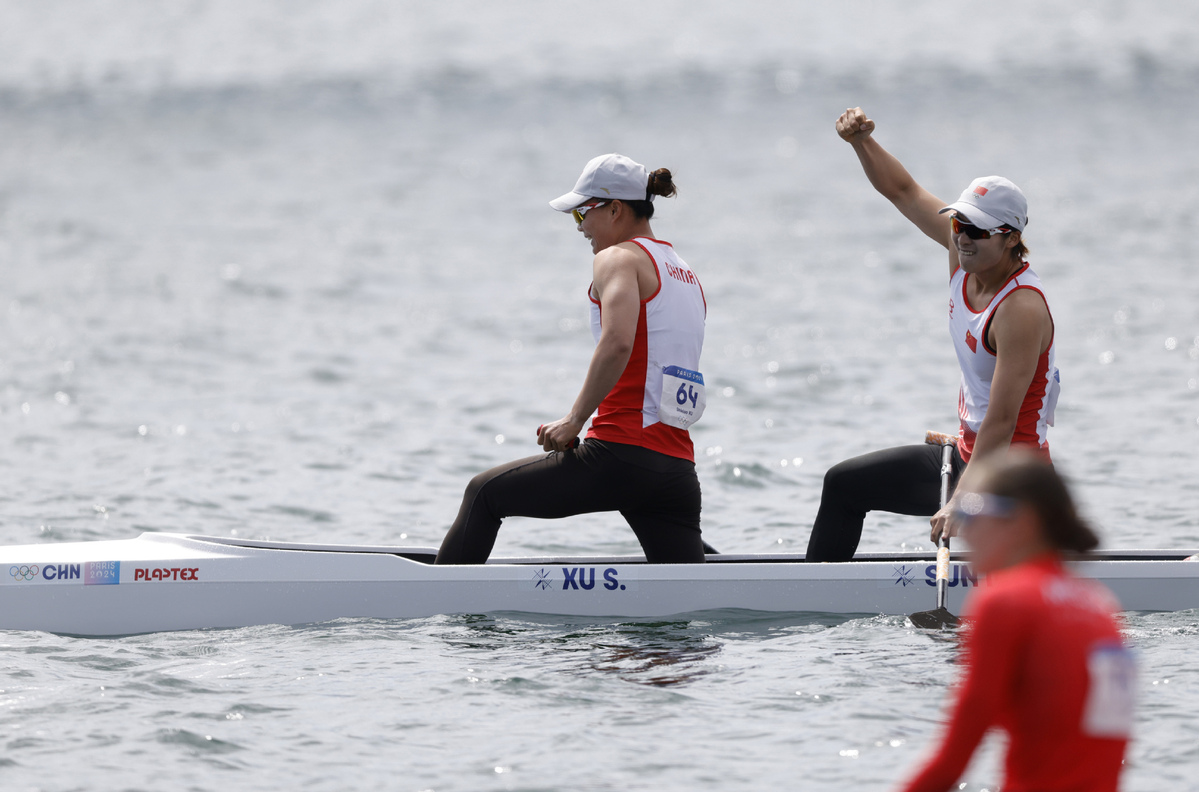
PARIS -- China's Xu Shixiao and Sun Mengya successfully defended their title in the women's canoe double 500m final at the Paris Olympics here on Friday.
The pair clocked an Olympic best of one minute and 52.81 seconds to win, 1.49 seconds ahead of Ukraine's Liudmyla Luzan and Anastasiia Rybachok. The bronze medal went to Canada's Sloan Mackenzie and Katie Vincent, who finished in 1:54.36.
Sun said after the race, "We were really determined to get this gold. From the Tokyo Olympics to now, from the start line to the finish line, we just tried to be the best."
"I believe that if we can further improve ourselves after the Tokyo Olympics three years ago, we can make a success in Paris," the 32-year-old Xu added. "We also prepared to break the world best time in the final, but failed to achieve that due to the heavy wind today, which posed challenges for us, especially for my partner's side."
In the men's canoe single 1,000m, Czech Republic's Martin Fuksa claimed the gold in an Olympic best of 3:43.16, followed by Isaquias Queiroz of Brazil and Moldova's Serghei Tarnovschi in second and third place, respectively.
"I have many medals from European and world championships, and now I finally have an Olympic medal, and it is gold," said Fuksa, who ranked fifth in the event at both the Rio and Tokyo Games.
Also on Friday, Lisa Carrington and Alicia Hoskin of New Zealand clinched the women's kayak double 500m title, while the men's kayak double 500m gold was claimed by the German pair Jacob Schoph and Max Lemke.
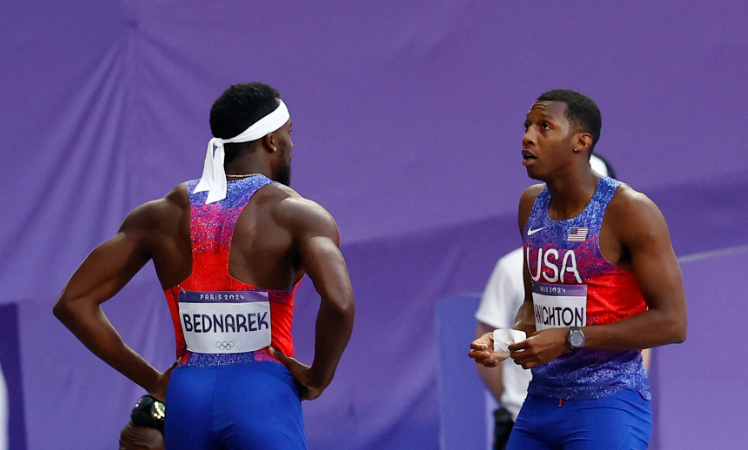
PARIS - American sprinter Erriyon Knighton, embroiled in a doping controversy, finished fourth in the men's 200-meter final at the Paris Olympics on Thursday. However, his abrupt departure from the media zone without taking interviews has only fueled further suspicion regarding his eligibility to compete.
Knighton tested positive for the banned steroid trenbolone during an out-of-competition test on March 26. The United States Anti-Doping Agency (USADA) opted not to impose a suspension, attributing the positive result to contaminated meat. This decision allowed Knighton to compete in the Paris Olympics qualifiers, a move that has sparked widespread concern.
China's Anti-Doping Agency (CHINADA) publicly questioned USADA's handling of the case, calling for an independent investigation into what it described as a serious breach of the World Anti-Doping Code and a potential cover-up of anti-doping violations.
Olympic regulations require all athletes to pass through the mixed zone for media interviews before leaving the venue. However, after the 200-meter final, Knighton was absent, leaving reporters waiting in vain. His absence stood in stark contrast to his teammate, Kenneth Bednarek, who won the silver medal and spoke openly with the media. Even Noah Lyles, who had tested positive for COVID-19, made a masked appearance to share his experiences.
When asked about Knighton's whereabouts, a US team staff member informed reporters that Knighton had already left and did not stop for interviews. Fellow journalists reported that Knighton hurried past the American TV reporters' interview area without saying a word.
"Knighton's silence is particularly striking given the ongoing scrutiny of doping practices," commented one pundit. "Questions remain as to why the typically outspoken Knighton has chosen not to address the media, leaving the doping controversy surrounding him unresolved in the public eye."
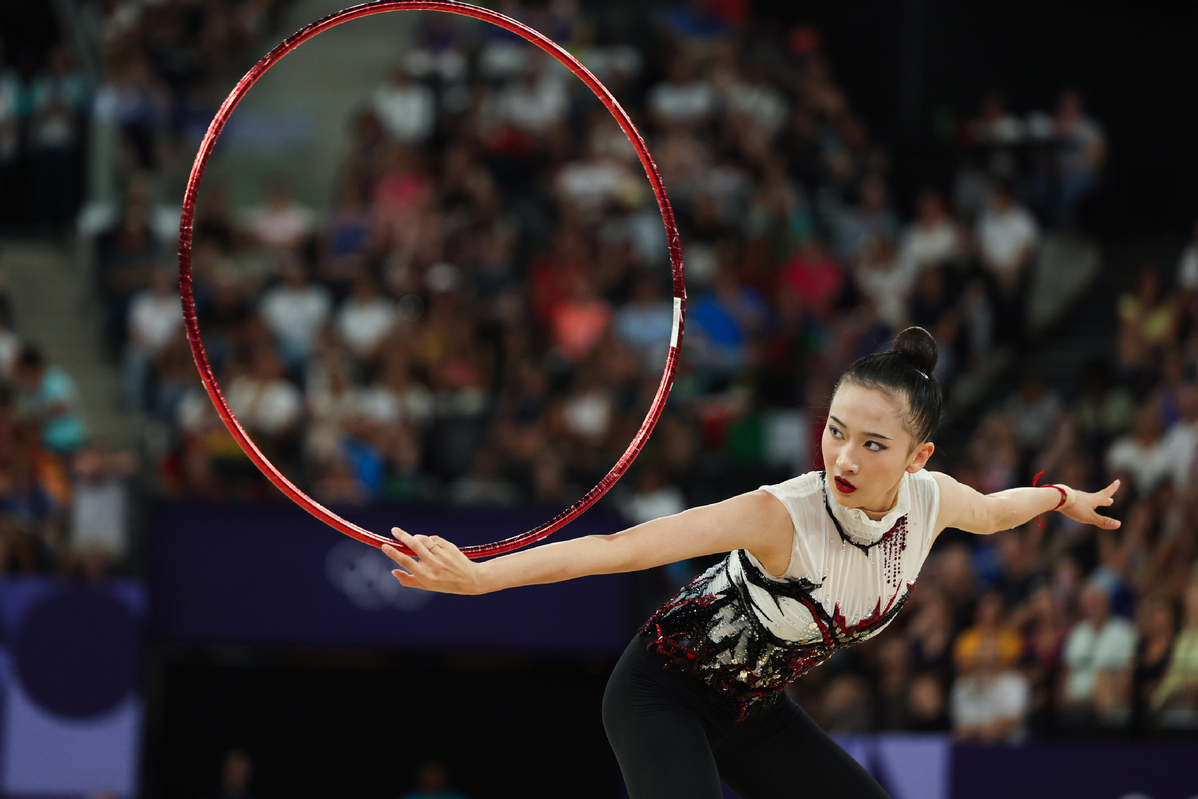
PARIS - China's Wang Zilu made history on Thursday at the Paris Olympics as the first Chinese athlete to qualify for the rhythmic gymnastics individual all-around final.
Wang, a 21-year-old Olympic debutant, scored a total of 128.100 points in the four rotations in ball, in hoop, in ribbon and in clubs of the rhythmic gymnastics individual all-around qualification at the Porte de La Chapelle Arena, ranking 10th in the total of the 24 athletes.
The top 10 gymnasts advanced to the final, which will be held on Friday.
Wang said after the match that although she had not performed well during the qualification, she was excited to advance to the final.
"At the beginning of the competition I felt quite nervous, so I did not get a very high execution points in the rotation one in ball. I also made some errors in the last rotation in clubs, which was regrettable," added Wang.
Discussing the final, she said she hoped to be able to compete at her best and have no regrets.
Italy's Sofia Raffaeli was on the top of the rankings in the individual all-around qualification with a total of 139.100 points.
"I'm happy for the routines I did, but the real competition is the final," said 20-year-old Raffaeli, the 2022 world champion and 2023 world runner-up.
Germany's Darja Varfolomeev, the 2023 world champion, slipped out of her early lead when she dropped her hoop, which subsequently rolled off the carpet. However, the 17-year-old came back strongly in the competition in ribbon and in clubs later to qualify second by a gap of 2.250 points.
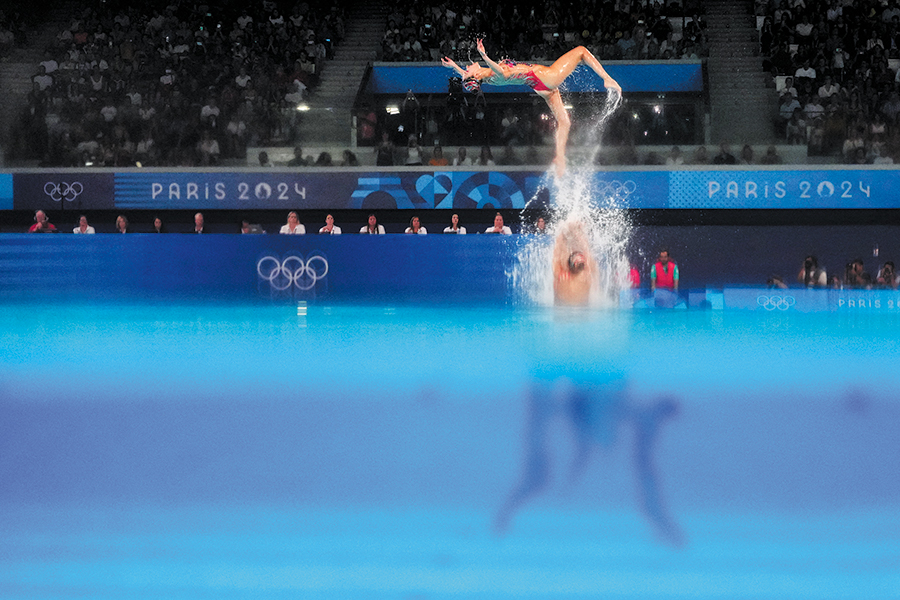
In 1983, by the outdoor swimming pool at Beijing's Taoranting Park, the seeds of a dream were planted, when a group of Chinese artistic swimmers gathered for the first time.
Nearly 15,000 days and nights of relentless effort from themselves and successive generations later, that dream has finally become a reality — China has been crowned Olympic champion.
On Wednesday night, in Saint-Denis in the northern suburbs of Paris, the Chinese artistic swimming team clinched a first-ever Olympic gold medal in the team event.
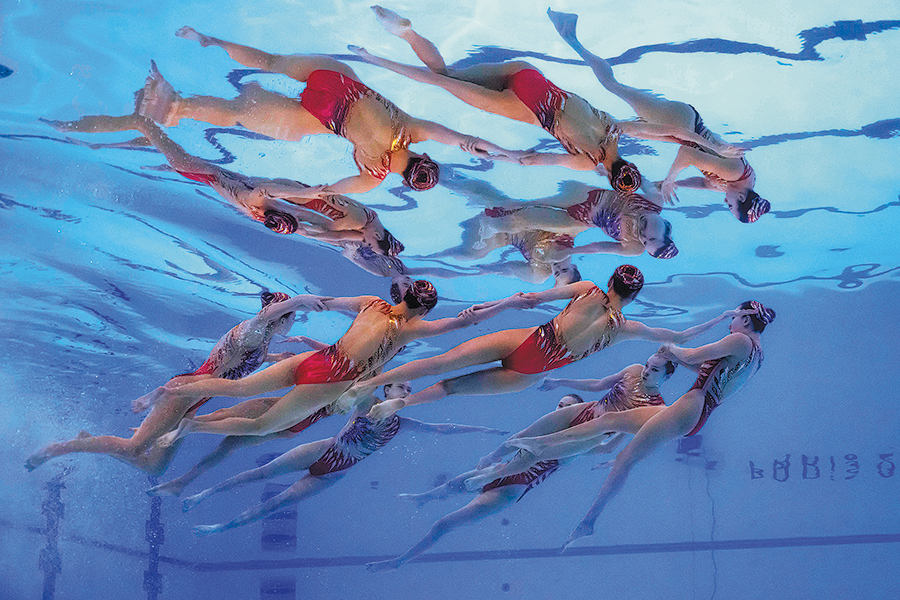
The team, consisting of Feng Yu, Chang Hao, Wang Ciyue, Zhang Yayi, Wang Liuyi, Wang Qianyi, Xiao Yanning, Cheng Wentao and Xiang Binxuan, delivered a stunning performance in the team acrobatic routine, earning 283.6934 points and taking their overall score to an insurmountable and history-making 996.1389.
"We have not only fulfilled our own dreams, but also carried the aspirations of generations before us. As a generation entrusted with a significant responsibility, we came to Paris thoroughly prepared, hoping that three years of hard work would yield a perfect result," said team captain Feng.
Before departing for Paris, Feng, who served as the female flag bearer for the Chinese delegation at the opening ceremony, vowed to "impress the judges and surprise the audience".
At the Olympic Aquatics Centre, that promise was fulfilled.
After their victory, the Chinese athletes celebrated by high-fiving every medalist. "Happiness needs to be shared. We wanted to share our joy with all the athletes, not just because it's our first gold medal, but because we are all winners," explained Wang Liuyi.
Wang Liuyi's twin sister, Wang Qianyi, was participating in her second Games. Sharing the Olympic stage with her sister made the moment even more special.
"Last time, I competed in the Olympics alone. This time, standing on the podium with my sister feels completely different. Even though it's a team event, having my sister by my side makes me even happier, especially because we won the gold medal," said Wang Qianyi.
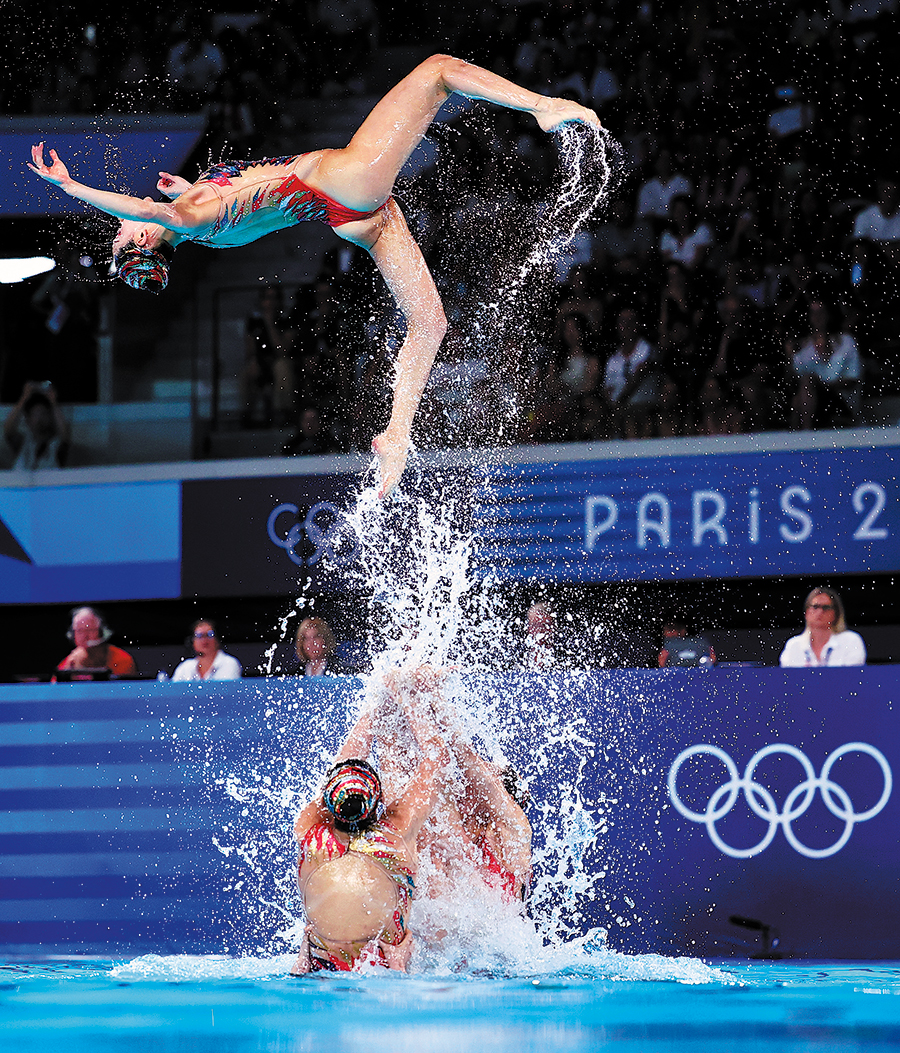
The Paris Olympics saw new rules introduced for the artistic swimming team event, which now includes a technical routine, a free routine and an acrobatic routine, each of which is scored separately. The team with the highest combined score is crowned champion.
A major change in the rules is that any mistake, or a failure to complete the declared difficulty, will result in the score being downgraded to the base score.
"With the new rules, all countries start on an equal footing. During our preparation, we faced both successes and setbacks. Despite the high expectations for this gold medal, we managed to handle the pressure," said Wang Liuyi.
"The biggest challenge is not the external competition or the difficulty levels of other countries, but ourselves."
In February, the team delivered its best-ever performance at the World Championships in Doha, securing seven gold medals, one silver and a bronze — a massive confidence boost ahead of Paris.
And what boost it was! On Aug 5, China led the field with a score of 313.5538 in the technical routine.
The following evening, they maintained their dominance in the team free, with a routine that scored 398.8917, the highest of the competition. Their routine featured a tribute to the Paris Games with a formation resembling the iconic Eiffel Tower.
On Aug 7, the team delivered a nearly flawless performance in its final routine, once again earning the highest score and setting a new benchmark in Chinese artistic swimming.
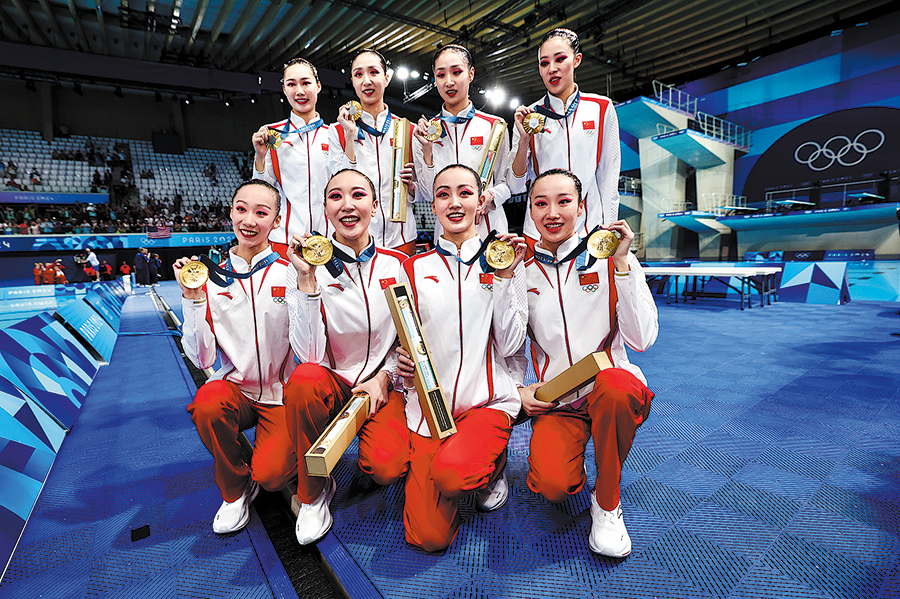
Zhang Xiaohuan, the team's head coach, explained that she integrated Chinese cultural elements into the routine choreography to emphasize the artistic sensibilities of the nation's heritage.
"For instance, one formation represents the Chinese character shan (mountain) found on ancient oracle bones, evoking the imagery of rising peaks. This also reflects our team's relentless pursuit of its dreams," she explained.
"Preparation was tough, but we kept ourselves in the fight and persevered. I think this was a great performance. We also drew inspiration from our competitors, as well."
Zhang Xiaohuan noted that the new rules required athletes to master challenging maneuvers that they had never attempted before, so there was not only considerable pressure, but a physical toll.
"They fought hard and never gave up. Training has been extremely demanding, with athletes suffering broken bones, facial injuries, and other issues that required hospital visits," Zhang Xiaohuan said.
She also acknowledged the crucial technical assistance from China's diving team, which played a key role in the high scores of the artistic swimmers in Paris. "I am very pleased with our performance, and I'm sure the Chinese diving coaches are proud of the results, too."
Zhang Xiaohuan was the captain at the 2008 Beijing Olympics, when the team won bronze.
"That bronze medal was very meaningful to me. Many teammates retired afterward, but I stayed to pursue my dreams. Today's gold medal is the result of the joint effort of several generations of artistic swimmers. It is through that continuous effort that we achieved this success," she concluded.
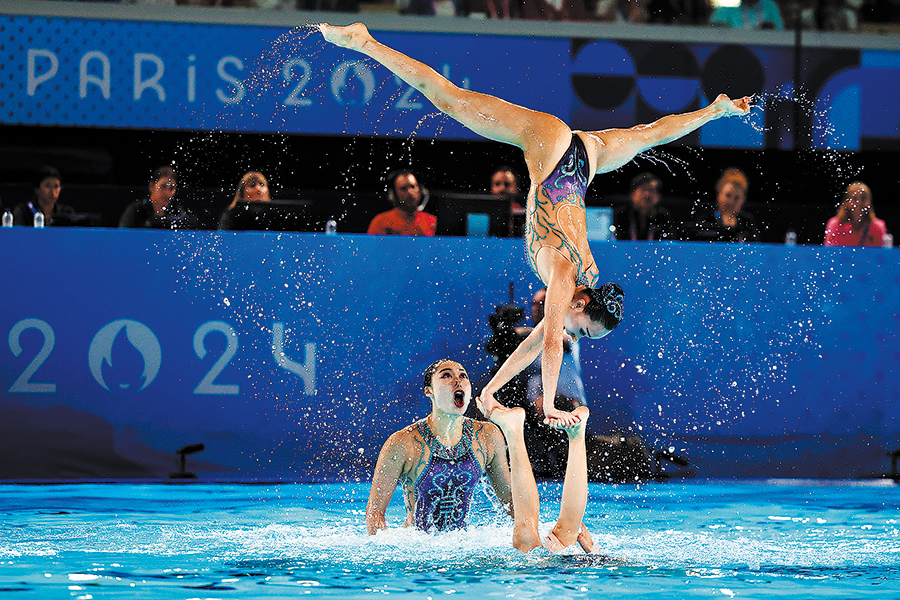
Decades of progress
When artistic swimming was added as an official Olympic sport in 1984, China had only just begun to develop the discipline. At the 1988 Seoul Olympics, China's solo swimmers were ranked outside the top 10, while the duet placed 9th.
Over the decades since, the Chinese artistic swimming team made gradual progress, with each advancement representing a major milestone.
At the 2004 Athens Olympics, the team achieved sixth place in the team event, a significant improvement from its seventh-place finish at the 1996 Games in Atlanta. It took eight years to achieve that single step up the ladder.
In 2006, the team enlisted world-class Japanese coach Masayo Imura, known as the "mother of synchro", who helped it overcome technical barriers and achieve significant progress. By the time the 2008 Beijing Olympics arrived, the team was ready to make a historic breakthrough, securing a first Olympic medal.
The team then dedicated 16 years to advancing up the steps of the Olympic podium. At the 2020 Tokyo Olympics, it earned silver medals in both the team and duet events, significantly closing the gap with the champion Russian team.
Now, in Paris, it has finally reached the highest position on the podium, not with a step, but with a leap, so great was the deficit in points with its nearest rival.
Yet the journey isn't over. The duet competition begins Friday, potentially featuring an unprecedented showdown between four sets of twin sisters from China, Austria, the Netherlands and Ukraine.
A compelling matchup, indeed, especially as the Chinese pair, Wang Liuyi and Wang Qianyi, have developed a taste for gold and are craving more.
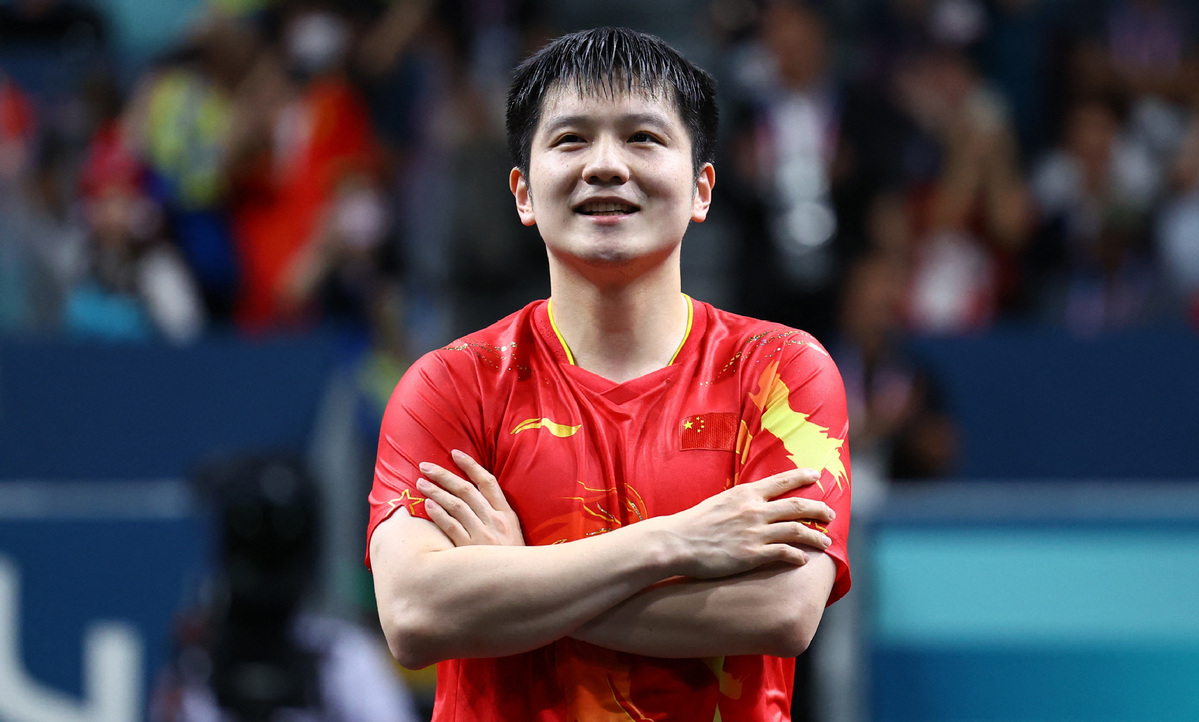
After winning the men's singles table tennis gold medal at the Paris Olympics, Fan Zhendong celebrated by mimicking the signature "crossed arms" goal celebration of French soccer star Kylian Mbappe. After completing the "Grand Slam" — winning the event at the World Cup, World Championships and, finally, the Olympics — emulating the young World Cup winner seemed fitting.
It was part of a series of tribute celebrations by Fan during the singles competition in Paris. Earlier, after defeating local favorite Felix Lebrun in the semifinals, he imitated Portuguese soccer star Cristiano Ronaldo's iconic "Siu" celebration. Following his quarterfinal match against Tomokazu Harimoto, Fan's raised-hand gesture resembled that of English soccer player Jude Bellingham.
"They inspire me to give my all on the field, never give up, always strive to win, and dare to win," Fan explained. "The atmosphere here is like watching soccer, very exhilarating. So, interacting in this way, I also hope to thank everyone."
All three players are past, present and future stars of Spanish soccer giant Real Madrid, Fan's favorite team. The profile picture on Fan's Weibo account, which has 3.75 million followers, is a photo of him wearing a customized Madrid jersey.
Competitive sports are universal, transcending events, nationalities, and languages. Fan, a dazzling table tennis champion, not only experiences the unique charm of each sport as a professional athlete, but also draws nourishment and energy from them, as well as friendship.
Fan's Weibo follows only 38 accounts, most of which are related to sports, with a notable exception being his favorite singer, Taylor Swift. His interests span a wide range of sports.
Before the Paris Olympics began, Fan encountered Spanish tennis players Rafael Nadal and Carlos Alcaraz in the Olympic Village and posted a photo with them on Weibo. "The Olympics mean far more to athletes than just the competition; it is a truly world-class stage, vibrant in every corner. I love and enjoy the Olympics!" he wrote.
Fan's friendship with German table tennis star Timo Boll is well-known, with soccer being a common interest. In May, Fan and Boll watched Borussia Dortmund's 1-0 win over Paris Saint-Germain on a tablet together during the WTT Saudi Arabia Grand Slam.
Last year, during the WTT Champions Frankfurt, Boll took Fan to a Borussia Dortmund match.
Fan shared in a vlog that, while the atmosphere of soccer matches differs from table tennis, both are equally enthralling. He noted that the excitement and cheering in soccer stadiums complement the intensity and skill of table tennis, providing him with a unique and enriching experience.
He once explained on Weibo about his life beyond competition: "On the court, I am a dedicated athlete representing my country and have strived for national honor for over a decade. Outside the arena, in my private life, I am simply an ordinary young man, with personal interests and relationships, aiming to be true to myself."
Following Fan's triumph in the men's singles, Real Madrid extended its congratulations on Weibo. Fan responded in Spanish, saying: "Thank you, because no one resists your desire to win!"
After his dominant semifinal performance, he commented on Weibo: "Hasta el Final!" This phrase, meaning "until the end", was inspired by a massive banner displayed by Madrid fans at Wembley Stadium in June, when it won the Champions League.
As a devoted soccer fan, the 27-year-old may deeply understand the slogan's message: there are no permanent champions in sports. True success comes from relentless perseverance.
It's something he expanded on in the recent documentary More Than a Champion: "People often only see the final results, not the process. By focusing on daily effort, I can accept any outcome. Losing is important to remember, but shouldn't define you.
"After losing in Tokyo, I was uncertain about the future, or if I'd win the World Table Tennis Championship again. Yet, dedication always pays off, and I'm more open-minded now than before."
Fan is now one step closer to completing his Paris journey — there's just one medal left to win.
Alongside teammates Ma Long and Wang Chuqin, Fan will strive to bring home the team gold against Sweden on Friday.
All that's left for the supporters to do is speculate about what celebration Fan has planned, and to hope that he gets to perform it.

Everything to win and nothing to lose.
The Chinese women's field hockey team is embracing its David-vs-Goliath final challenge against top-seed the Netherlands as a golden opportunity to restore pride and appeal to the once glorious program.
Underrated and overlooked, the Chinese squad has put its rejuvenation on full display in Paris after defying long odds to advance into its first Olympic final in 16 years, riding on momentum driven by having one of the sport's legends at its helm.
Coached by Australia's two-time Olympic champion Alyson Annan, Team China put up a gusty fight against European powerhouse Belgium — which stands three places above China in the International Field Hockey world rankings — in Wednesday's semifinal.
China started strong, with Zou Meirong scoring a second-quarter goal. However, the Belgians managed to tie the match at 1-1, thanks to a last-minute equalizer from Emma Puvrez, sending a legion of Belgium fans into frenzy at the Yves-du-Manoir Stadium in the western suburbs of Paris.
That's how it stood at the end of regulation time.

After conceding two goals in the nerve-wrecking shootout, Team China kept its cool to score three in a row. Goalkeeper Ye Jiao then rose to the high-stakes occasion, denying the Belgians' next three attempts with heroic saves to secure China an Olympic final berth — it's first at an overseas Games. The last time was at Beijing 2008, where the home team faced off against the mighty Dutch. It will be a case of deja vu, then, when the pair meet again in the French capital.
While the challenge will be monumental against the No 1-ranked Netherlands, the "Snow Lotuses" have an edge this time around, with Annan — former mentor of the Dutch team — now in China's corner.
No matter what step it eventually occupies on the podium, Team China has already turned heads and earned respect for a victorious Olympic campaign in many ways, said Annan of her players.
"We have talked about this a lot since I started. We want to win a medal. We want to be on the podium in Paris. This is why we do this," Annan said of the confidence and belief she's instilled into the team since she took the helm in 2022.
"I hope the message is that dreams do come true, and you have to dream to be able to have that vision. And the girls saw it and went after it, and, now, they've got both feet on the silver and are one step from gold.
" (We have) everything to win and nothing to lose," said Annan, who led the Netherlands to the gold medal at Tokyo 2020.

Entering the Olympic knockout stage as a dark-horse contender, Team China proved its medal credentials by upsetting its coach's native national side, the Hockeyroos, in a solid 3-2 quarterfinal thriller — a bittersweet result for Annan.
"I have mixed feelings," she said following the victory on Monday. "I'd have preferred this to have been the final."
With all of China's other qualified ball-sport teams having already crashed out of the Paris Games, the women's hockey squad has served up a huge morale boost for the whole delegation by at least clinching a silver medal.
After going up against its European rivals with the crowd rooting against it in almost every game, Chinese captain Ou Zixia expects the team's return to the top table to draw more support and exposure back home.
"Hopefully, what we did here will bring more attention to the sport in China, inspiring more girls to pick up a hockey stick and give it a try," Ou told the handful of Chinese journalists in the mixed zone after the semis.
"This means everything for the sport's profile and for everyone on the team. For us, we don't think it as the end of a tough journey. We take it as a new beginning for the sport to be better developed," said the defender, who's represented Team China in 172 international matches across three Olympic Games.

Speaking of the biggest difference that Annan's coaching crew, including her assistant Ric Charlesworth, has brought to the program, Zou, Wednesday's goalscorer, said it's all about self-confidence accumulated by practicing with, and drilling against, the Western powerhouses.
"I think it's kind of an advantage for us to be considered as an underdog, while at the same time we believe more in ourselves and that we are actually way better than people think," said the 23-year-old midfielder who's scored two goals in Paris.
Since Annan took over the Chinese program, the team has spent the past two years traveling extensively to train in Europe and Australia, and play quality opponents in the FIH Pro League. Gradually, it has become more balanced offensively and defensively.
With the Aussie's coaching blended with the traditional discipline and zealous work ethnic of Chinese athletes, Team China had climbed to No 6 in the world rankings prior to the Games, all the way from No 14 when Annan took over.
Now, it seems that the scalps of Australia and Belgium were nothing unexpected, at least for Team China's young aspirants.
"Mentally, we are stronger than ever, and, tactically, we've managed to keep pace with the strong European teams. We just need to hit them when they're off their guard," said Zou.

If it weren't for the different flags sewn on the athletes' uniforms, some early-round table tennis matches at the Paris Olympics could have been mistaken for a national championship in China.
The women's singles match between China's 23-year-old Sun Yingsha, the top seed and world No 1, and Luxembourg's Ni Xialian, 61, left the crowd marveling at the huge age gap between the two players.
Both athletes speak Mandarin and were born in China, and developed their table tennis skills under the Chinese training system, which has seen the country dominate the sport.
Despite a straight-sets loss to Sun in the round of 32 on July 31, Ni etched her name in table tennis history. She is the first woman to have competed in table tennis at six Olympic Games and the oldest to win a match after she defeated Sibel Altinkaya of Turkiye in the opening round on July 27.
An hour after that match, another showdown between two Chinese-born athletes sent the crowd at the South Paris Arena into a frenzy. Veteran Yuan Jianan, representing the host nation France, outplayed Zhang Mo of Canada to advance to the round of 16.
Three days earlier, Portugal's three-time Olympian Fu Yu delivered a major upset by defeating the 9th seed Jeon Ji-hee of South Korea in straight sets. Despite playing under different flags, fans in China rooted for the two "foreign" athletes, who were both born in Hebei province.
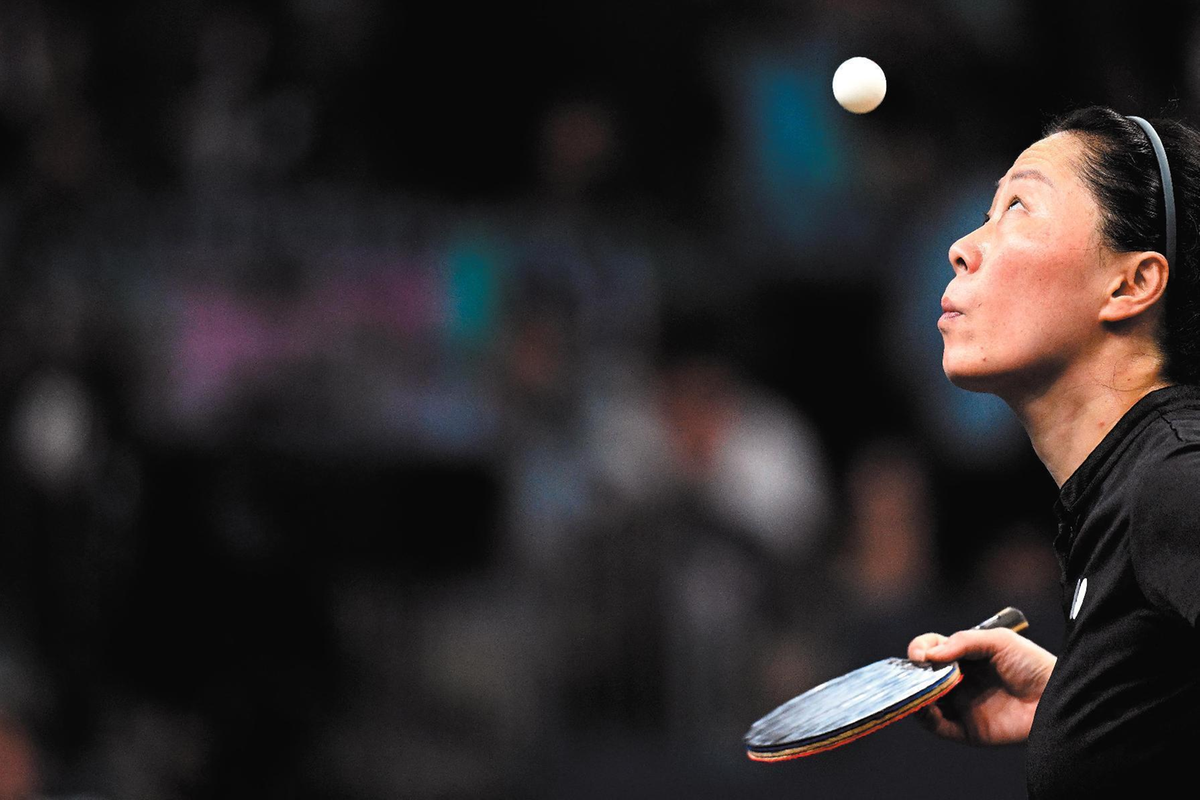
Excess of talent
Chinese-born players representing adopted countries is a trend that started in the 1980s. Back then, Chinese athletes began changing nationality to compete for other countries, driven by the prospect of brighter career opportunities, which wouldn't be available to them at home.
As a world power in sports like table tennis, badminton and diving, China is never short of talent thanks to its rigorous State-run development system.
With these sports producing more world-class talent than China needed, some of those "surplus athletes" opted to pursue their athletic careers elsewhere, after being approached by national Olympic committees of other countries eager to boost their talent pool.
In table tennis alone, as many as 13 players born on the Chinese mainland, where they developed their skills, are representing other NOCs in the men's and women's singles tournaments at the Paris Games.
The two oldest table tennis players at the Paris Olympics, Ni and her former teammate Zeng Zhiying, 58, were among the first generation of Chinese national team players who moved overseas to extend their sports careers by becoming naturalized citizens of other countries.
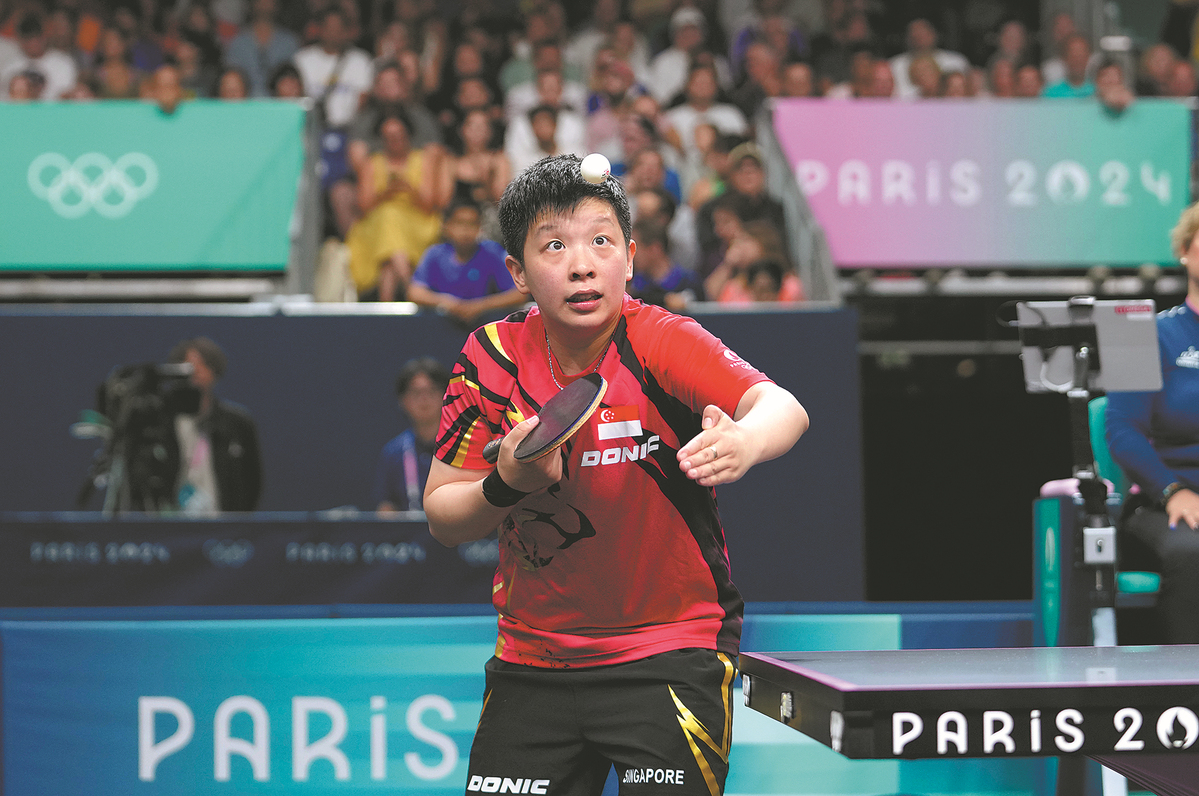
Chinese media have dubbed these sporting emigrants the "foreign legion". While they only have a slim chance of beating better players from their country of birth, they relish the opportunity to participate in international competitions.
"If I'd stayed in China, I probably would have never had the chance to compete at the Olympics because there is always too much talent coming from the pipeline of the Chinese system," Zeng Jian, 27, who represents Singapore in table tennis, told China Daily after her round of 32 match in Paris.
The four-time Commonwealth Games medalist was born in China's Hunan province. She started table tennis training at the age of 6 at the Shichahai Sports School in Beijing. In 2013, she represented the Beijing team in the Chinese Table Tennis Super League, playing doubles with former world champion Guo Yan.
With the domestic competition too intense for her to advance any further, she joined the Singapore Table Tennis Association in late 2014.
Zeng said she has no regrets about the life-changing decision. "I feel grateful for the Singapore association offering me a chance where my skills and years of hard work could be appreciated," she said, adding the switch helped her play in the international arena, which wouldn't have happened if she had stayed in China.
With cultural and language similarities to China, since the late 2000s Singapore has emerged as an ideal destination for Chinese-born table tennis players seeking new opportunities.
Bolstered by former Chinese youth team members Feng Tianwei and Wang Yuegu, the Singapore women's team shocked the Chinese squad with a 3-1 win at the 2010 World Team Championships final. It is the biggest upset win of the "foreign legion" against their birth country.
To encourage the development of homegrown talent across the world, the International Table Tennis Federation tightened its rules on athlete naturalization in 2008. It banned athletes older than 21 who had switched nationalities, from representing his or her adopted country in international competitions.
The rules also impose a waiting period of at least three years before a naturalized athlete can represent his or her new national, or regional, association.
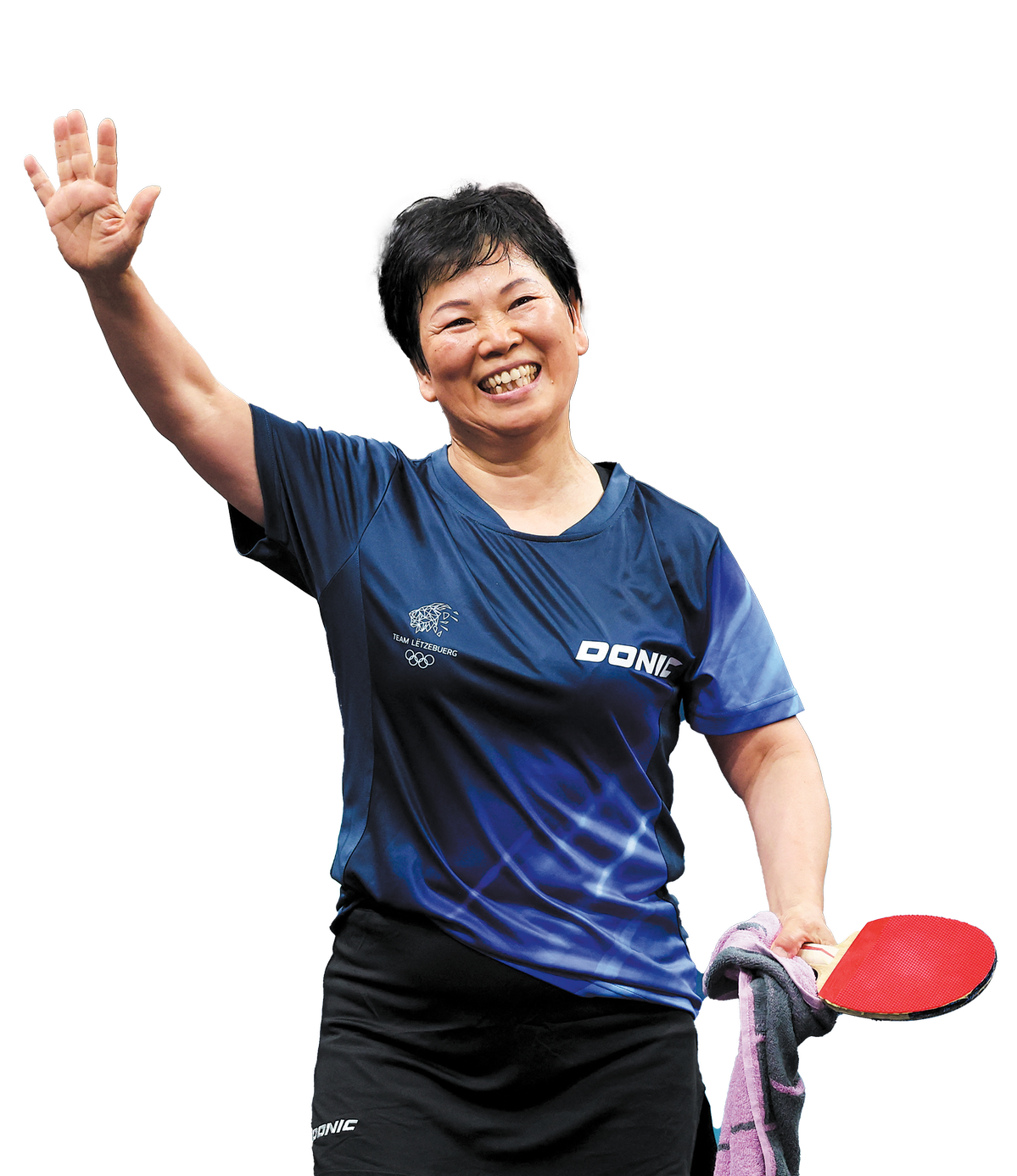
Teammates reunite
Major international events such as the Olympics have also become a stage for reunions of old friends and former teammates born in China.
In Paris, Luxembourg's Ni reconnected with her former teammate Zeng Zhiying, 58, almost four decades after they both played for Team China in the 1980s. Zeng made her Olympic debut in Paris representing Chile.
Zeng was born in 1966, and her mom was a table tennis coach. She picked up a paddle as soon as she could hold one, and joined the junior team at a military sports school in Beijing at the age of 11. Zeng started to compete at national-level events the next year.
Like all her peers, she aspired to make her country proud on the international stage, and harbored a longtime dream to compete at the Olympics. However, Zeng's attempt to qualify for the Los Angeles 1984 Olympics came up short due to the intense competition among her peers, including Ni, for spots on the national team.
Failing to make it to Los Angeles, Zeng retired and moved to Chile, and accepted an invitation to coach school children in the northern city of Arica. She said she "adored" her coaching job.
Zeng didn't pick up a table tennis paddle again until 2003 when she wanted to introduce her 13-year-old son to the sport to try and drag him away from video games and watching television.
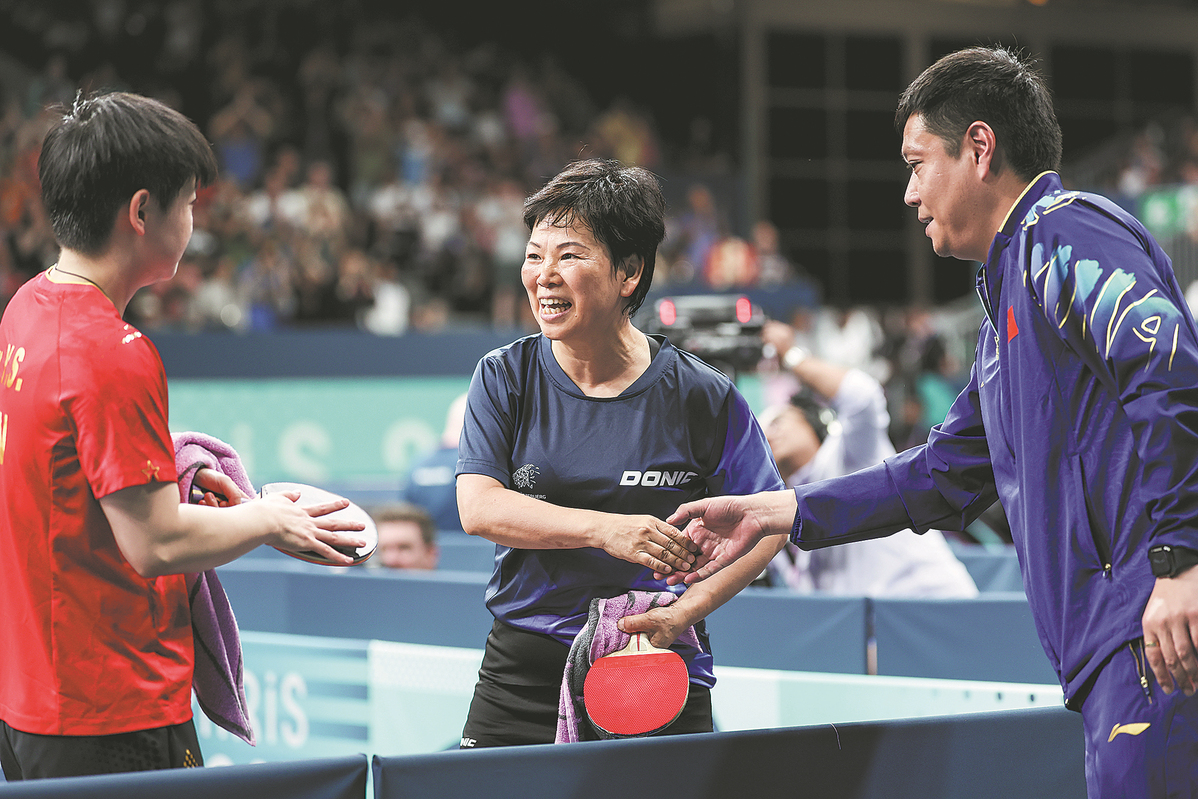
However, the competitor now in her 50s realized she could still win at the national level in Chile, which rekindled her Olympic dream.
"I love this country," she said after losing in the preliminary round at the Paris Games on July 27. "I didn't reach my dream in China, and I have here. It's important not to give up."
Despite her early exit from the competition she had every reason to be proud of her efforts in Paris. Her husband and two sons cheered her on in the South Paris Arena and her 92-year-old father back in China was able to see his daughter's lifelong dream come true.
Ni, who was in China's squad at the 1983 Table Tennis World Championships, said they were both on the national team for a period of time.
"It's not easy for her to make a return to this level after not playing for such a long time," Ni said. "No matter what, she built her foundation in the Chinese national team, and that will always make a difference (in international competitions). I congratulate her for making it to Paris."
As to whether her Olympic journey is over, Ni said she is not planning to hang up her paddle any time soon. With support from the sport's governing body in Luxembourg and the grand duchy's government, she said she remains fresh and motivated, even at the age of 61.
"Age is just a number," said Ni, who was born in Shanghai and began her career with the city's women's team in 1978.
She moved to Germany in 1989 for career prospects, and settled down in Luxembourg two years later. There she met her husband Tommy Danielsson, the then Luxembourg national team coach.
"Three years ago, Paris 2024 felt so far away, but I just thought let's keep trying," she said.
"Our team really needs me, and everyone was working so hard. I saw staying around as a way to motivate them. If we make it (to Los Angeles 2028), great. If we can't, then we just enjoy the journey."
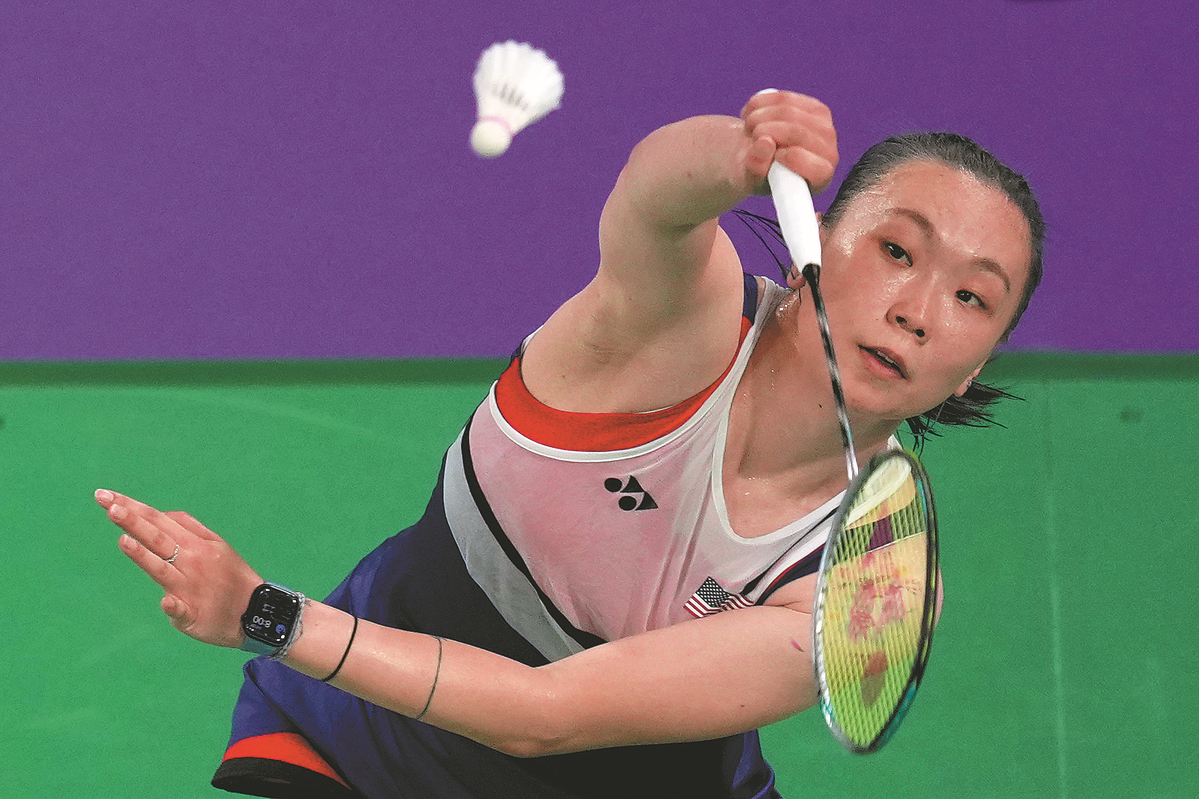
Second thoughts
In addition to table tennis, Chinese names can also be found on several other countries' team lists for badminton and diving.
However, the transition to a different culture, coupled with the language barrier, can make it tough for some Chinese athletes to fit in to their adopted homes.
Zhang Beiwen, a badminton player representing the United States in Paris, said it's not always easy to navigate cultural differences, especially for those who moved overseas at an older age. "If you move to the US too late, I don't think it's worth it," said Zhang.
She started playing badminton in her hometown of Anshan, Liaoning province, and moved to Singapore along with her provincial team coach at the age of 13. Following a feud with her coach, she resettled in the US in 2013 and joined Team USA.
" (Latecomers) will have a hard time learning the language and getting used to the social environment," she said.
"It's not easy to compete at your best on the court when you have to deal with new challenges in life adapting to a new home."
Not all China-born athletes receive a warm welcome in their adopted countries, as sometimes their presence is seen as compromising the development of homegrown talent.
"There have always been some complaints from local fans," said Peter Hubner, a sports reporter covering table tennis in Paris for German media outlet Deutsche Presse-Agentur.
"They're afraid that the use of Chinese immigrants may affect the resources and funding allocated to developing native talent. It makes sense. But it will be easier for the second generation of Chinese players to be accepted."
